 03/11/2008 16:21 03/11/2008 16:21 |
|
| | | OFFLINE | | Post: 15.567 | Registrato il: 28/08/2005
| Utente Gold | |
|
 Posted earlier today (10/25) in the preceding page
Posted earlier today (10/25) in the preceding page:
Muslims to seek 'crisis management plan' in meetings at the Vatican this week - Reuters story.
Pope Benedict celebrates Mass for recently deceased bishops and cardinals - News agency photos and
story translated from the Italian service of Vatican Radio.
* * * * * * * * * * * * * * * * * * * * * * * * * * * * * * * * * * * * * * * * * * * * * * * * * * * * * * * * * * * * *
 Christians and Muslims
Christians and Muslims
resume dialogue, thanks to the Pope
by Samir Khalil Samir, SJ

Beirut, Nov. 3 (AsiaNews) - From November 4-6, 25 Catholic scholars and 25 Muslims will meet at the Vatican to study the possibilities for collaboration between the two largest religions in the world: 1.4 billion Muslims and 1.18 billion Catholics.
The representatives of more than one third of the planet will meet on the theme of "Love of God and love of neighbor." On the first day, they will address theological-spiritual themes; on the second day, they will turn to "Human dignity," exploring issues related to human rights, religious freedom, religious respect, possibly alluding to the freedom to convert and change religions.
The general theme emerged over the past two years, not without some difficulty. After Benedict XVI's address in Regensburg on September 12, 2006, the Muslim world reacted with violence and rejected the Pope's proposal to recognize that the relationship with God implies reason and excludes violence. Many of the reactions were due to ignorance of the address, and familiarity only with what was reported (often in a distorted manner) by press agencies and newspapers.
Thanks to the Regensburg address, 38 Islamic scholars sent an initial response letter (October 13, 2006), and a second letter one year later (signed by 138 scholars, since expanded to 275) in order to seek out common ground of collaboration between Christians and Muslims.
In turn, on November 19, 2007, Benedict XVI responded to the letter of the 138 by opening a possible collaboration in various areas. On December 12, 2007, a letter to Cardinal Bertone from Jordanian prince Ghazi bin Muhammad bin Talal agreed to the collaboration.
On March 4-5, personalities of the Vatican Curia and of the Islamic world met to establish the procedures and content of this dialogue. At the conclusion, the two sides announced the creation of a Catholic-Islamic forum "to develop dialogue between Catholics and Muslims."
It is this forum that is meeting for the first time in Rome from November 4-6. On the 6th, the group will have an audience with Benedict XVI. One of the participants in the meeting is Fr. Samir Khalil Samir, who offers us this analysis:
This encounter between Muslim and Catholic experts in November is a start, and is positive for the mere fact that it is being held: dialogue is better than indifference and reciprocal silence.
In recent years, an important change has taken place. At first, the letters from the Muslim scholars requested a dialogue that would be exclusively, let us say, theological. But this ran the risk of being unproductive.
The Holy Father and Cardinal Tauran stressed that dialogue would have to include the problems of daily life and the rights of conscience. One of the Muslim participants, Tariq Ramadan, agreed on this point.
The relationship between Christians and Muslims has had a tumultuous history. During the 1960s, after Vatican Council II, there was a strong push from the Catholic side. There was also significant, sincere openness on the part of Muslims. Then two things happened:
a) With time, dialogue is extinguished if it is not supported by a permanent structure. The dialogue with the Orthodox and with other Christian confessions is regular: we meet every year, there are mixed commissions . . . With Islam, on the other hand, it has depended on the circumstances: sometimes the leaders have wanted it, other times they haven't . . .
b) The second reason is that during the 1970s, the wave of fundamentalist movements began, with the Islamic world itself being the first to suffer. This development blocked everything, because its stance is rejection of the other [1].
The position of the Salafis (fundamentalists) is, on many points, in opposition to modernity and to the West where it originated; this has led to a diminution of dialogue.
It is worth noting that this resumption is due precisely to the address in Regensburg. And this is acknowledged by some Islamic experts as well [2].
The Pope's address was the beginning of a new movement of rethinking. If it prompted a positive response, this is because he spoke truth, and without hatred. This confirms that if there is no truth in dialogue, it produces nothing.
About fifty people will participate in the forum, in equal numbers, although the names have not been published. But already it is possible to sketch some perspectives for opening a collaboration. I think that we can take many steps forward. But the many points of misunderstanding and friction must be confronted with calm and sincerity.
If we talk about dogmas, we must clarify the Christian position on Islam, the Qur'an, and the person of Mohammed, seeking to understand their position and telling them what we believe and why.
On the Muslim side, it is important that they be clear about the significance of our faith in the Trinity, the incarnation of the Word, the unity of God, etc., in order to avoid launching false accusations. Because if accusations are true, we must change.
In the West, there has been controversy over the opening of Islamic schools or mosques. But this is not a problem that concerns Islamic-Christian dialogue. Prohibitions or bans come from the secular state, and are not intended to defend Catholics.
The problem here is of agreeing on what a place of worship is, which must not be confused with a place of militancy and struggle. The state must clarify what the characteristics of these places must be, and if anyone breaks these rules, it must have the authority to take away this right.
The same is true of the schools. In France, for example, there are rules that the state imposes in order to recognize any school, including Islamic ones. These norms must now be clarified. Until now, the need for this was not felt, because there was an obvious common foundation. But now, with our pluralist and globalized society, this clarification must be made.
For example, the state must specify whether it is the government that grants the land for the building of places of worship or not; whether or not it is permitted to pray in the street [in short, practical matters that have to do with the free practice of one's religion provided such practice does not harm or interfere with the rights of others].
I do not know how fruitful this dialogue can be: the considerable number of participants (more than 50 in all) brings the risk that the discussions may not be deep or productive.
Both religions claim to bear a message of truth, and are called to proclaim it it and spread it in mission. But the ways in which this is to be done must be specified.
Using means unworthy of religion, or that are prohibited, must be excluded. The Muslims, for example, accuse the Christians of conducting proselytism by doing "favors" for the poor, and asking for conversion in exchange. But it is unjust to block advancement while permitting a religion to spread. [????]
The idea that is promoted in the Muslim world, "the truth has all rights, falsehood has no rights," is also unjust. On the basis of this, the possibility for non-Islamic religions to spread is practically excluded [3].
To this is connected the contempt for apostates - as happened with the baptism of Magdi Cristiano Allam - who are viewed as traitors, instead of seekers of truth.
Having schools is also important for both religions, and therefore this right must be defended, and must not be denigrated as proselytism.
Conclusion
My impression is nonetheless that this dialogue can be fruitful if it respects three dimensions:
1) It must begin, and continue for years;
2) At the end, concrete, and documents must be drawn up, and distributed as widely as possible;
3) Maximum authority must be given to these documents. This is easy on the Catholic side: it is enough for a cardinal or another authority to sign it.
On the Muslim side, there must be agreement among religious personalities and Islamic politicians.
The laws that limit religious freedom are made by Islamic governments, not by Muslim scholars. Everyone who participates in this dialogue, and returning to his country, must reach out to his government another Muslim associations.
Furthermore, the decisions that depend on states should be voted on by the "Organization of the Islamic Conference." For this not to happen would be a discouragement. The authority of the document is important.
But the first and most urgent need is for religious freedom: the right of every religion to preach and to spread itself through legitimate and licit means, and not with illicit means, which must be enumerated.
This is a spiritual principle - because it touches on the dignity of man - and also a theological principle, because it touches on the principle of man created in the image of God, free and therefore free to make mistakes.
I hope that this meeting will soon result in a joint document on religious freedom.
Footnotes:
[1] From this point of view, it is worth pointing out that dialogue does not mean "putting one's own beliefs aside." We Catholics, even if we believe that the Catholic Church bears the truth, also believe that there are seeds of the Word, of truth, in other religions.
[2] See Tarik Ramadan: "After causing a wave of shock, the words of Pope Benedict XVI in Regensburg two years ago have doubtlessly had more positive than negative consequences over the long term. Beyond the controversy, this conference prompted an examination of the nature of the respective responsibilities of both Christians and Muslims in the West." Cf. Il Riformista, October 31, 2008.
[3] Every day in the Muslim world, we see the Muslim faith proclaimed (on the radio, television, in newspapers, with megaphones from the mosque), but a Christian cannot even wear a cross, because "the spreading of falsehood" is forbidden.
[Modificato da TERESA BENEDETTA 03/11/2008 16:27] |
|
 03/11/2008 21:39 03/11/2008 21:39 |
|
| | | OFFLINE | | Post: 15.571 | Registrato il: 28/08/2005
| Utente Gold | |
|
 Benedict the preacher
Benedict the preacher
by Mons. Gianfranco Ravasi
President, Pontifical Council for Culture
Translated from

Nov. 3, 2008
Benedetto XVI
«Omelie. L'anno liturgico narrato da Joseph Ratzinger, papa»
('Homilies: the liturgical year narrated by Joseph Ratzinger, Pope'
Edited by Sandro Magister, Libri Scheiwiller, Milan
180 pp, 18 euro.
It was most likely a small village synagogue. There, on a Sabbath, a man rose to read a passage from the prophet Isaiah. In the silence of those present, he rolled the scroll closed, handed it back to the attendant, and sat down.
"In the synagogue all eyes were on him". Then he spoke, and it was one of the shortest preachings ever heard.
"Today," he said, "this scripture passage is fulfilled in your hearing."
The uproar that followed the first stunned silence proved that the preacher had succeeded to upset what the skeptic Voltaire would formulate in the words "Sacred eloquence is like Charlemagne's sword, long and flat". A stereotype earlier described by Montesquieu who said that "what they lack in depth, orators make up for in length".
Everyone knows whose homily that was, which was so short and provocative; the evangelist Luke tells us (4,20-21) it was Jesus who, soon after, would be approached by the guard of Jerusalem's Jewish clergy with an arrest order.
But the guards, says the evangelist John (7,45-46), went back to the high priests and the chiefs of the Pharisees with empty hands. "Why did you not bring him?", they asked. The guards answered, "Never before has anyone spoken like this one."
Even the recent Bishops Synod assembly voiced the now habitual and unfortunately well-founded complaint about the poor quality of Sunday sermons (one hopes, this was also a self-criticism) and even expressed the wish for a 'manual' on homilies, listing the minimum basis for a method:
- What do the proclaimed Bible readings say?
- What do they say to me (the homilist) personally?
- What should I tell the community, considering the concrete situation?
Well, if anyone wants a homiletic paradigm, here is one at the disposal of 'sacred orators', but most especially, of the listeners, often victims of leaden sermons, 'the torment of the faithful', according to Carlo Bo (though certainly not in the Augustinian sense of being able make consciences uneasy).
These are the 27 homilies delivered by Pope Benedict XVI in the past liturgical year - which, as everyone knows, starts towards the end of November with Advent - in many different contexts, from St. Peter's Basilica to Australia, from Genoa to Paris, from Brindisi to Cagliari, etc.
Whoever has been a habitual reader of this Pope's texts will have discovered right away his unmistakable stylistic and theological brand.
Thus, for example, one will expect to hear the voices of the ancient Fathers of the Church whose homiletic writings often are inlaid in the Ratzingerian text. Not limited to his beloved Augustine or the eminent John Chrysostom ('golden mouth' - a name and a program) [which, one might add, in the German form 'Goldmund' was applied to Joseph Ratzinger early on in his career as priest and professor], or Ignatius of Antioch. But equally present are important figures who are not known to many, like Gregory of Nyssa, Cromatius of Aquileia or Anselm of Canterbury.
Constant in the homilies is that they are rooted in the Biblical text proposed by the liturgy of the day, not disdaining even a philological and semantic approach where appropriate.
For instance, the participle 'symballousa' applied to Mary by Luke (3, 19) is not the simple 'meditate' as it is usually translated, but 'putting together' - as the pieces of a mosaic - "in order to uncover a grand mystery, little by little".
Or, the distinction between bios and zoeas used by the evangelist John leads to the consciousness that the gift offered by Christ cannot be reduced to the biosphere, but extends beyond - to a knowledge, a love and vitality that is transcendent.
Or he might take a particular text which is apparently marginal or descriptive, and shows that it is like an iridescent crystal with further meanings. For instance, in the Johannine sentence "(Jesus) knowing that the hour had come to pass from this world to that of the father...", he extracts the verb 'pass from' and makes it shine with many facets - 'metabainein/metabasis' - which guards theological secrets.
These are the things one might discover listening to the preacher Benedict XVI on the first level of his meditations on Sacred Scripture. But there is also the other dominant dimension to grasp, what he calls 'performative' - since the homily is a message that is born of faith and life, and is meant to generate faith and life.
It is not easy to give examples of this, because we must invite the reader to enter directly in tune with the text, on the same wave length. And he will soon meet up with so many surprises that directly interpellate his conscience.
Often, this could come from a symbol, as last Christmas with the Pope's evocation of certain late medieval artistic representations which transformed the animal stall of Bethlehem 'into a rather crumbling palazzo'.
Or the symbolism in Isaiah's 'thick cloud that envelops nations', which the Pope applied to an illusory globalization.
Or the word 'idol', whose Greek etymology ('image, figure, representation', but also 'spectre, phantasm, a vain appearance"), leads to an intense denunciation of modern idolatries.
Let us linger 'listening' to the preacher Pope, without forgetting that he reminds us of a fundamental fact: the homily is not a commemorative discourse or a lesson, but a sacred act within the liturgy which is a double banquet on the Word of God and the Bread of the Eucharist.
That is why such an elevated occasion cannot be debased into boring theological drivel, nor to a rhetorical instrument used for other explicit or implicit ends, nor to spiritual sentimentalism.
Benedict XVI's voice and example should exorcise these deviancies - a voice which is moderate but not empty, substantial but not merely theoretical.
In his rich and exemplary preface to this volume of papal homilies, editor Sandro Magister - whom many know as a topnotch journalist, but who also has solid academic theological training - shows the significance of the Pope's preaching in the context of his general Magisterium.
NB: The book will be presented at the Palazzo Valdina in Rome on Wednesday, November 5, at 6 p.m., by Giancarlo Cerutti (president of Gruppo Sole 24 Ore), with addresses by Sandro Bondi, the Minister for Cultural Assets, Cardinal Camillo Ruini, and Sandro Magister.
[Modificato da TERESA BENEDETTA 03/11/2008 21:57] |
 03/11/2008 23:18 03/11/2008 23:18 |
|
| | | OFFLINE | | Post: 15.572 | Registrato il: 28/08/2005
| Utente Gold | |
|
 The first meeting of
The first meeting of
the Catholic-Muslim forum:
A choice for the future
by Francesco M. Valiante
Translated from
the 11/3-11/4 issue of

When Christians and Muslims sit together to discuss 'love of God' and 'love of neighbor', the stake in play goes far beyond simple good neighborly relations. It is the very future of mankind.
Not simply because a third and a fifth of the world's population belong to the two religions, respectively, but because the new world dynamic, which has brought religion to the center of public discourse, also globalizes the duties and responsibilities of believers.
To the point where many are convinced that dialog can no longer be just a 'seasonal choice' but a 'vital necessity', as three years ago, Benedict XVI had pointed out acutely in Cologne, during the first encounter of his Pontificate with a Muslim community.
"It seems believers are condemned to dialog", quipped Cardinal Jean Louis Tauran, president of the Pontifical Council for Inter-Religious Dialog (CIRD), at an international congress in Castel Gandolfo last October.
Thus the fate of what Andre Malraux had predicted to be the 'religious century' must pass this challenge. A year ago, this was also grasped by the 138 Muslim representatives who were the original signatories to an open letter addressed to Pope Benedict XVI and other Christian leaders and church communities on October 13, 2007.
That letter says at the outset that "if Muslims and Christians are not at peace, the world cannot be at peace". That letter - and the answer to it by Cardinal Tarcisio Bertone in the name of the Pope - started the process that has led to the first encounter tomorrow of the Catholic-Muslim Forum which will take place in Rome from Tuesday, Nov. 4, through Thursday, Nov. 6. [The writer forgets, egregiously, that the process started with the Pope's Regensburg lecture, to which the Letter from the 138 was a response that took a year coming.]
Participating will be two delegations composed of 29 persons each (religious authorities, experts and advisers). Heading the Catholic delegation will be Cardinal Tauran, while the Muslim delegation head is the Grand Mufti of Bosnia-Herzegovina, Mustafa Ceric.
The theme of the closed-door seminar, "Love of God and love of neighbor", will be examined in its 'theological and spiritual foundations' on Day 1, and from the viewpoint of "the dignity of the human being and mutual respect' the following day. The concluding day will start with an audience with Benedict XVI and end with a public session at the Pontifical Gregorian University.
The aim and contents of the seminar - revealed by its theme - are traceable to the letter of the 138 and the Pope's response.
The basic intention of the Muslim initiative is tho show that 'the two greatest commandments' of love of God and love of neighbor represent common ground among the three religions that consider Abraham as father of the faith.
The letter was significant in reducing tension following the situation created after the exploitation and misunderstanding of Pope Benedict XVI's lecture on faith and reason at the University of Regensburg in September 2005.
The Pope expressed his appreciation of the 'positive response' in the reply sent by Cardinal Bertone on November 19, 2007, to Prince Ghazi bin Muhammad bin Talal, president of Jordan's Royal Institute for Islamic Thought.
"Without ignoring or minimizing our differences as Christians and Muslims," the Vatican letter said, "we can and should pay attention to what unites us."
The letter exchange led to a series of contacts between the CIRD and the principal Muslim signatories, and a meeting in Rome on March 4-5 this year, at which it was decided to constitute the Catholic-Muslim Forum and to organize this November encounter.
It must be remembered, however, that such Catholic-Muslim interaction is not entirely new. After centuries of conflicts and encounters, efforts at rapprochement started in the 20th century, particularly after Vatican-II.
Of course, there followed new oppositions and misunderstandings, but there were also contacts which became periodic and more frequent. Thus, the series of meetings held in the past year by the CIRD with Islamic institutions and organizations in various parts of the world.
Among the most important, the session in Cairo last February of the mixed commission for dialog, which was instituted by the CIRD in 1998 with Al-Azhar University, one of the oldest Islamic religious academies, founded in the 10th century, and currently the most prestigious theological institution of Sunni Islam.
The Muslims have likewise sent out important signals. Such as the Congress for Inter-Religious Dialog called in Madrid four months ago by Saudi Arabian King Abdullah, custodian of Islam's two holiest sites, Mecca and Medina.
These are currents that allow us to look at this week's seminar with reasonable hope. Even if a healthy dose of realism is obligatory, the intense preparatory activity seems to be a good point of departure.
But the agenda has crucial unresolved problems such as those related to religious freedom and fundamental human rights for men, and equality for women. A strong commitment to resolve these questions is called for.
Particularly in the name of full and effective religious freedom which continues to be a sore point in relations with Muslim states. In fact, this was one of the propositions presented to the Pope by the recently concluded General Assembly of the Bishops' Synod.
The bishops' text significantly began with a statement from the Vatican-II declaration Nostra aetate on the Church's relationship with non-Christian religions, which 43 years ago, 'condemned any discrimination among men or any persecution perpetrated for religious reasons", with a specific reference to the evangelist John's sentence that 'he who does not love does not know God".
The Council Fathers were right: Christians and Muslims today can meet on the common basis of the 'two great commandments of love'.
* * * * * * * * * * * * * * * * * * * * * * * * * * * * * * * * * * * * * * * * * * * * * * * * * * * * * * * * * * * * *
The unspoken problem is, of course, that any concrete actions on giving Christians the same religious freedom and rights that Muslims enjoy in Christian countries can only come from the government of the Muslim states - and it is not at all clear what influence, if any, the Muslin religious leaders and intellectuals have with their respective governments on religious freedom for non-Muslims, since most Islamic states consider it both a religious duty as well as a political necessity to make Islam the only publicly allowable religion!
King Abdullah, for instance, has never made a statement about religious freedom in his initiative for inter-religious dialog that embraces even the Jews. Meanwhile, the million or so Filipino Catholics working in Saudi Arabia cannot worship publicly or wear a cross in public.
Not one of the high-profile Muslim intellectuals involved in this initiative has ever attempted to rationalize the rigid Muslim precept that looks down on 'infidels' and considers them, at best, second-class citizens. [Not incidentally, many of them criticized the public baptism of Magdi Allam by the Pope last Christmas.]
How does all that square with 'love of God and love of neighbor'?
[Modificato da TERESA BENEDETTA 04/11/2008 01:57] |
 04/11/2008 03:00 04/11/2008 03:00 |
|
| | | OFFLINE | Post: 3.394 | Registrato il: 23/11/2005
| Utente Master | |
|
Why I'm going to meet the Pope
It is a matter of greatest urgency that a Christian-Muslim dialogue on theological issues and broader values takes place
Tariq Ramadan
guardian.co.uk
Monday November 03 2008 14.21 GMT
Now that the shock waves touched off by Pope Benedict XVI's remarks at Regensburg on September 12 2006 have subsided, the overall consequences have proven more positive than negative. Above and beyond polemics, the Pope's lecture has heightened general awareness of their respective responsibilities among Christians and Muslims in the west.
It matters little whether the Pope had simply mis-spoken or, as the highest-ranking authority of the Catholic church, was enunciating church policy. Now the issue is one of identifying those areas in which a full-fledged debate between Catholicism and Islam must take place. Papal references to "jihad" and "Islamic violence" came as a shock to Muslims, even though they were drawn from a quotation attributed to Byzantine emperor Manuel II Palaiologos. It is clear that the time has come to open debate on the common theological underpinnings and the shared foundations of the two religions. The appeal by Muslim men of religion, "A Common Word", had precisely this intention: our traditions have the same source, the same single God who calls upon us to respect human dignity and liberty. These same traditions raise identical questions concerning the ultimate purpose of human activity, and respect for ethical principles.
In a world that is experiencing an unprecedented global crisis, a world in which politics, finance and relations between humans and the environment suffer from a cruel lack of conscience and ethical integrity, it is a matter of greatest urgency that Christian-Muslim dialogue turn its attention to both theological issues and to those of values and ultimate aims. Our task is not to create a new religious alliance against the "secularised" and "immoral" world order, but to make a constructive contribution to the debate, to prevent the logic of economics and war from destroying what remains of our common humanity.
Our constructive dialogue on shared values and ultimate goals is far more vital and imperative than our rivalries over the number of believers, our contradictory claims about proselytism, and sterile competition over exclusive possession of the truth. Those dogma-ridden individuals who, in both religions, claim truth for themselves, are, in fact, working against their respective beliefs.
Whoever claims that he alone possesses the truth, that "falsehood belongs to everybody else ... " has already fallen into error. Our dialogue must resist the temptation of dogmatism by drawing upon a comprehensive, critical and constantly respectful confrontation of ideas. Ours must be a dialogue whose seriousness requires of us, above all else, humility.
We must delve deep into history the better to engage a true dialogue of civilisations. Fear of the present can impose upon the past its own biased vision. Surprisingly, the Pope asserted that Europe's roots were Greek and Christian, as if responding to the perceived threat of the Muslim presence in Europe. His reading, as I noted after the lecture at Regensburg, is a reductive one. We must return to the factual reality of the past, to the history of ideas. When we do so, it quickly becomes clear that the so-called opposition between the west and Islam is pure projection, an ideological instrument if you will, designed to construct entities that can be opposed or invited to dialogue, depending on circumstances.
But the west has been shaped by Islam, just as Islam has been shaped by the west; it is imperative that a critical internal process of reflection begin: that the west and Europe initiate an internal debate, exactly as must Islam and the Muslims, with a view to reconciling themselves with the diversity and the plurality of their respective pasts.
The debate between faith and reason, and over the virtues of rationalism, is a constant in both civilisations, and is as such far from exclusive to the Greek or Christian heritage; nor is it the sole prerogative of the Enlightenment. The Pope's remarks at Regensburg have opened up new areas of inquiry that must be explored and exploited in a positive way, with a view to building bridges and, working hand in hand, to seeking a common response to the social, cultural and economic challenges of our day.
It is in this spirit that I will be participating on November 4, 5 and 6 in Rome, and in the meeting with the Pope scheduled for November 6. Our task will be to assume our respective and shared responsibilities, and to commit ourselves to working for a more just world, in full respect of beliefs and liberties. It is essential, then, to speak of freedom of conscience, of places of worship, of the "argument of reciprocity"; all questions are possible in an atmosphere of mutual confidence and respect.
Still, it is essential that each of us sit down at the table with the humility that consists of not assuming that we alone possess the truth; with the respect that requires that we listen to our neighbours and recognise their differences; and, finally, the coherence that summons each of us to maintain a critical outlook in accepting the contradictions that may exist between the message and the practice of believers. These are the essential elements to be respected if we are to succeed.
|
 04/11/2008 04:13 04/11/2008 04:13 |
|
| | | OFFLINE | Post: 3.396 | Registrato il: 23/11/2005
| Utente Master | |
|
AIDE SAYS PONITFF TO PACK HOPE FOR AFRICA TRIP
Spokesman Expects Whole Church to Focus on Continent
VATICAN CITY, NOV. 3, 2008 (Zenit.org).- Benedict XVI will make his first trip to Africa to give hope to peoples that suffer violence and poverty, says a Vatican spokesman.
Jesuit Father Federico Lombardi, director of the Vatican press office, affirmed this on the most recent edition of Vatican Television's "Octava Dies."
The Holy Father announced at the end of the world Synod of Bishops his plans to travel to Angola and Cameroon next March, an announcement that Father Lombardi called "an important piece of news."
"John Paul II," he said, "who had given Africa his passionate attention -- coming to be called 'John Paul II the African' by [the late] Cardinal Hyacinthe Thiandoum [of Dakar, Sengal] -- was unable to return to the continent during the last years of his pontificate. His last brief trips there were in '98 to Nigeria and in 2000 to Egypt and Sinai."
For his part, Benedict XVI has not yet traveled to Africa in his three and a half years as Pope.
"Certainly, Africa, with its grave problems, has been present in his words and his heart, but a trip always has broad implications of participation, presence and direct contact," Father Lombardi continued. "Moreover, 2009 will be the year of the special assembly of the synod of bishops for Africa, and the Pope's trip will have a fundamental role in its preparation, such that the whole of the Church will direct its gaze toward Africa.
"The spiritual and practical solidarity of the universal community of believers will accompany the renewed commitment of growth in the Catholic communities which -- like that of Angola -- already have five centuries of life, have their history and tradition with their base that serves for looking to the future."
"All of us have in mind the dramatic images of conflict and poverty, but also an extraordinary vitality of the continent, which must be liberated, animated, sustained and oriented, so that Africans can build Africa with dignity and hope," Father Lombardi concluded. "A message of hope: This is certainly what Pope Benedict XVI will bring to African lands."
|
 04/11/2008 10:22 04/11/2008 10:22 |
|
| | | OFFLINE | | Post: 15.575 | Registrato il: 28/08/2005
| Utente Gold | |
|

OR for 11/03-11/04/08:
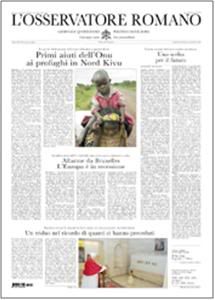 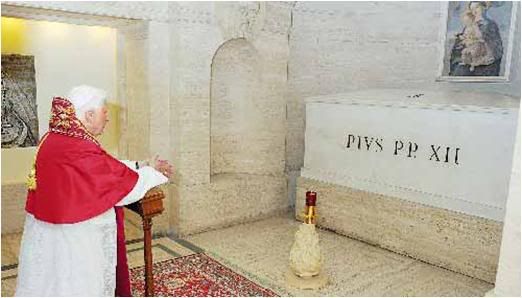
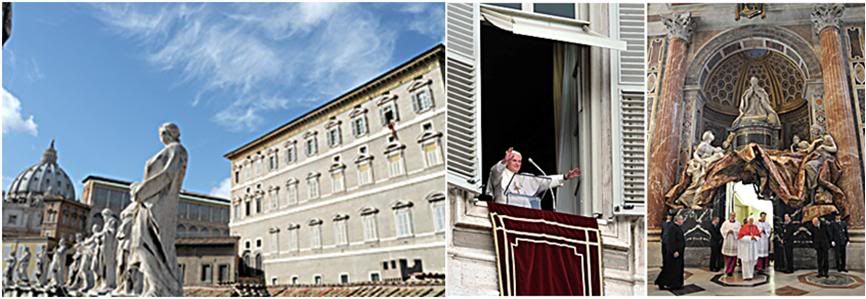 The main headline is on 'Initial UN aid to the refugees of North Kivu', and there is an editorial commentary, 'A choice for the future', on the first session of the Catholic-Muslim Forum that starts today at the Vatican. The front-page picture shows Benedict XVI at the tomb of Pius XII on November 2, in a story about the Papal 'triduum' that included two Angelus messages on the Feasts of All Saints and All Souls, as well as yesterday's papal Mass for the cardinals and bishops who passed away in the past 12 months.
The main headline is on 'Initial UN aid to the refugees of North Kivu', and there is an editorial commentary, 'A choice for the future', on the first session of the Catholic-Muslim Forum that starts today at the Vatican. The front-page picture shows Benedict XVI at the tomb of Pius XII on November 2, in a story about the Papal 'triduum' that included two Angelus messages on the Feasts of All Saints and All Souls, as well as yesterday's papal Mass for the cardinals and bishops who passed away in the past 12 months.
Significantly, besides the choice of the Pope's picture at Pius II's tomb on Nov. 2 (he visited the tombs of his other predecessors), the inside pages also carries a story about the opening yesterday of an exhbit on 'Pius XII: The man and his Pontificate' at the Charlemagne Arm of the Bernini Colonnade, with three articles taken from the exhibit catalog.
No events scheduled for the Holy Father today,
The Pontifical Council for Inter-Religious Dialog has a formal announcement on the opening today of the three-day Catholic-Muslim Forum sessions.
[Modificato da TERESA BENEDETTA 04/11/2008 13:26] |
 04/11/2008 11:30 04/11/2008 11:30 |
|
| | | OFFLINE | | Post: 15.576 | Registrato il: 28/08/2005
| Utente Gold | |
|
 Cardinal Tauran:
Cardinal Tauran:
'Dialog obliges each side
to be witnesses to their faith'
Interview by
Michel Kubler and Isabelle de Gaulmyn
Translated from

Nov. 3, 2008
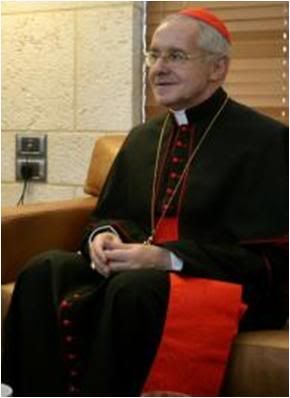
Appointed in June 2007 by Benedict XVI to be President of the Pontifical Council for Inter-Religious Dialog, Cardinal Jean Louis Tauran talks about what is at stake in the Catholic-Muslim Forum sessions which start at the Vatican Tuesday.
With this Forum, can one say there is a new stage in the Islam-Catholic dialog?
It's an important meeting because the "Letter of the 138" (Muslim intellectuals who wrote the Pope as a response to his Regensburg lecture) was an initiative from the Islamic world which took into account the various sensibilities within Islam.
Moreover, the letter cited from both the Old and New Testaments rather than from the Koran, which was a mark of respect.
However, one must avoid giving the impression that this is the beginning of a new dialog. We have actually been in dialog for more than 1,400 years. More recently, since the Vatican-II declaration Nostra aetate, a regular dialog was instituted which has been fruitful. This Forum represents a new chapter in a long history.
Between John Paul II and Benedict XVI, one senses there has been a change in orientation...
What strikes me most is that this Pope has made inter-religious dialog one of the priorities of his Pontificate. He spoke about it during his visits to the Untied States and to France.
However, Benedict XVI thinks such a dialog must not consist in finding the least common denominator, to say that all religions are equal. He always refers to the demands of truth. And for us, that means Jesus Christ as the only mediator.
As to whether there has been a change of orientation with respect to John Paul II, I think it is more correct to say that the situation with Islam changed after September 12, 2001, requiring more clarity.
Since, according to Benedict XVI, inter-religious dialog must take place with a reaffirmation of the heart of the Christian faith, is this not contradictory?
Dialog cannot take place unless there is no ambiguity whatsoever. One must look at each other, listen to each other, respect each other. And affirm one's identity. Otherwise there is no dialog.
To discover and know the other, to assume we have our differences, there is a risk. If I ask the other who is his God, how does he live his faith, then I take on the risk that he will ask me the same things.
So it is important that I know how to profess my own faith and to measure my life against the faith I profess. Inter-religious dialog is always a call to affirm one's identity. Its aim is not to convert each other, but to get to know each other.
Under what conditions would a theological dialog be possible?
That has not really started. We will see with this Forum what it will be like when we speak about the love of God, up to what point we can go together. It's important to know each other's theological thinking and the differences that come from different religious traditions.
Can this go as far as to speak of the same God?
It's not easy. For us, God is a Father, for them, he is not. And of course, we have different ways of reaching God. Nonetheless, we must remember what Nostra aetate says: "The Church regards the Moslems with esteem. They adore the one God, living and subsisting in himself, merciful and all-powerful, the Creator of heaven adn earth, who has spoken to men" (No. 3). This text is fundamental in answering your question.
Benedict XVI has often insisted on freedom of conscience and religious practice. Will this question be raised at the Forum?
I hope so. We must see how the participants will want to approach it. This comes within the context of the need for reciprocity - what is good for me is good for you. In other words, if a Muslim can freely have a place of worship in Europe, then the same should be true about a Christian living in a Muslim society.
But we have not made the principle of reciprocity a condition for dialog - in which we don't follow the logic of 'Do ut des' (I give so that you may give back), because that would be anti-Christian.
I believe, however, that by being clear and firm, we can arrive gradually at a change in attitudes. For instance, the Saudi Arabian King came to visit the Pope, and one feels that things can evolve.
At the Madrid interfaith meeting (last July at the Saudi King's initiative), the religious leaders present underscored the need in a globalized world to live in reciprocity.
The problem is that these initiatives for dialog appear displaced in the face of daily reports about anti-Christian violence or persecution in many countries. And how do we pass on genuine openings in dialog among leaders to the masses?
How do you distinguish between Islam and Islamism?
Islamism is the work of Muslims who have gone astray. Killing in the name of Islam is an act that majority of Muslims reject. But is Islamism inherent within Islam? That's a question that one should ask the Muslims themselves, because they have different interpretations about this.
In Europe, how does the Church view the 'competition' from Islam?
I would avoid using the term 'competition'. The high-profile visibility that the Muslims have taken has led entire populations to take a position on the subject of religion.
In France until recently, one tended to consider religion as a completely private matter - that one could practice it as long as it was not seen.
Today, believers demand to be able to practice their faith in private and in public, respecting traditional limits. This goes just beyond freedom of worship. Freedom of religion should also include participating in the public dialog, to have one's own schools hospitals and social institutions...
Religion has a social dimension. In the West, the Muslims are now a significant minority, and it is normal to guarantee their freedom of religion as one does for other believers. In the face of this, it is important for Christians to know the content of their own faith so that dialog is possible in a coherent and sensible way.
Because in the end, inter-religious dialog obliges both sides to be witnesses for their faith. All believers have the responsibility to remind their brothers and sisters in humanity that 'man does not live by bread alone' (Dt 8,3; Mt 4,4).
* * * * * * * * * * * * * * * * * * * * * * * * * * * * * * * * * * * * * * * * * * * * * * * * * * * * * * * * * * * * *
In Cardinal Tauran, Benedict XVI has chosen a firm and clear-minded 'minister' for inter-religious dialog who, like him, goes beyond insubstantial Kumbaya platitudes to the heart of genuine dialog. Deo gratias.
* * * * * * * * * * * * * * * * * * * * * * * * * * * * * * * * * * * * * * * * * * * * * * * * * * * * * * * * * * * * *
Earlier last week, La Croix attempted to summarize the history of Islamo-Christian dialog in modern times, and although it is necessarily told from the French point of view, it is nonetheless useful because the French have worked on it in a more focused way - due to their colonial history in both the Near East aND North Africa.
The stages towards a common path
for Islamo-Christian dialog
that still has to be delineated
By Martine de SAUTO
Translated from

Oct. 26, 2008
Earlier pioneers may have opened the way, but the Islamo-Christian dialog did not get engaged until after Vatican-II, and it was amplified thereafter by John Paul II.
Benedict XVI is engaged in the effort, but with more clarity and firmness.
In September 2006, after Benedict's Regensburg lecture, the dialog between Christians and Muslims seemed to have reached an acute crisis. Muslims, including the more moderate, considered it as a rupture of the initiatives undertaken by John Paul I. And some Catholic circles also saw a change in tone.
Later however, as Maurice Borrmans (1) recalls, "a lot of things have happened". Between the two religious communities that each have more than a billion members, the stakes are too important to break off dialog.
For centuries, the relationship between Muslims and Christians, shaped by historical circumstances, has been one of confrontation. Starting in the 19th century, the Christian attitude towards Islam started to be more flexible. Protestant and Catholic missionaries established friendly relations with Muslim communities and even rendered service to them.
Around the same time, Emir Abd el Kadr, who distinguihsed himself in 1860 by defending the Christians of Damascus, contributed to change the Christian image of Muslims. By the end of the century, Charles de Foucauld (canonized in 2006 by Benedict XVI), with his work in North Africa, embodied evangelical respect for the Muslim faith.
It was a time when local churches tended to favor better knolwedge of Islam. Since the 1920s, courses on Islam have been offered at the pontifical universities.
In 1937, three young Dominicans - Georges Anawati, Jacques Jomier and Serge de Beaurecueil – agreed to a suggestion by Fr. Marie–Dominique Chenu to undertake sudies of Islam and Arab culture in Muslim countries. They initiated a theological and spiritual dialog with Muslims in Egypt, and thus in 1945, the Dominican Isntitute for Oriental Studies in Cairo was born.
Then the Peres Blancs* (White Fathers) created a house for study and research in Tunisia, which gave birth to PISAI, the Pontifical Institute for Arab and Islamic Studies, in which Fr. Borrmans would be an essential figure until recent years.
*[The Peres Blancs are a Society of Apostolic Life founded in 1868 by the first Archbishop of Algiers, later Cardinal Lavigerie, as the Missionaries of Our Lady of Africa of Algeria, now known also as the Society of the Missionaries of Africa, with the post-nominal initials M. Afr.]
Things began to move on the ground. Christian missionaries in Africa became involved in standing up for Muslim rights. In Algeria, this solidarity was expressed through a figure like Mons. Duval. At the same time, in France, Christians were working to help Muslim immigrants from North Africa.
An important threshold was crossed after Vatican-II with Nostra aetate, the formal declaration of Church relations with non-Christian religions that was promulgated by Paul VI on October 28, 1965, stating that:
"The Catholic Church regards Muslims with esteem (who)adore one God... Since in the course of centuries, not a few wuarrels and hostilities have arisen between Christians and Moslems, thie sacred synod urges all toforget the past... and to promoe together for the benefit of all mankind, social justice and moral welfare, as well as peace and freedom."
Institutions have been created to organize dialog and facilitate its development. Beginning with the Pontifical Secretariat for relations with non-Christians, which became the Council for Itner-Religous Dialog (CIRD) in 1987.
In France, the bishops instituted a secretariat for relations with Islam (SRI) in 1973, and in practice, every bishops' conference in Europe has done the same. The COE [the article doesn't spell out the acronym!] which has been building bridges to Islam, has a specialized office for this in Geneva. Publications have accompanied these developments. Theological considerations have been promoted by men like Robert Caspar.
In 1967, the Catholic Institute of Paris created an Institute for the sciences and theology of religions (ISTR) which is, of course, involved in the Islamo-Christian dialog. Other similar institutes have followed. Many Anglican and Protestant theology faculties have done the same.
The Christian churches of Near Africa and the Near East have been publishing texts promoting spiritual encounters. The Group for Islamo-Christian Research (GRIC), was formed in Tunisia in 1977, bringing together universities from many nations that ar engaged in the field.
Various non-religious organizations have also been born, like the Group for Islamo-Christian Friendship (GAIC) which organizes yearly weeklong encounters in Europe between Muslims and Christians.
But the 1960s and 1970s were marked by irenism (conciliatory peaceableness). John Paul II would prove to be more realistic. In 1985, at Casablanca, before 80,000 young Moroccans, he expressed the hope for collaboration as a dialog of cultures and spiritualities, and a common effort for development.
But he also insisted on the need for 'reciprocity' in favor of Christian minorities. His visit to Cairo's Al-Azhar University, Sunni Islam's most prestigious academic institution, then to the Omayyad Mosque in Damascus, and his addresses in different Muslim countries allowed establishing a channel of dialog with theological and pastoral content.
Official encounters took place between local churches and Muslim leaders, even as some Muslim institutions like the University of Tunis and the Royal Academy of Jordan took similar initiatives for dialog.
"But even if dialog did acquire a certain poplarity," says the Jesuit priest Christian Van Nispen (2), "after about two decades of effort, some evidence of fatigue, and even of mistrust, has set in. In fact, long before Sept. 11, 2001, revived reciprocal mistrust, skepticism was growing among Christian communities".
The reasons, he says, were rising extremism in the Near East, the assassination of Christian missionaries in Algeria and the persecution of non-Muslim minorities in the Sudan and Nigeria. Since then, the exodus of Christians from Palestine and Iraq has underscored the limits of dialog and the impact of socio-political contexts.
In view of all these difficulties, Benedict XVI has placed the issue on a new basis. While he remains faithful to the spirit of Nostro aetate and encourages progress along its lines, he subscribes to a different kind of dialog which exphaszies two points: a dialog of cultures, which is indispensable for the good of mankind, rather than theological dialog [which is really pointless except about beliefs held in common, but what practical good does that do, except to keep theologians and scholars busy?]]; and freedom of conscience and religious practice.
NOTES:
(1) A White Father, who wrote Dialogue islamo-chrétien à temps et contretemps, Éd. Saint-Paul, 254 pp.
(2) Author of Chrétiens et musulmans. Frères devant Dieu, Éd. de l’Atelier, 188 pp.
[Modificato da TERESA BENEDETTA 05/11/2008 17:28] |
 04/11/2008 11:55 04/11/2008 11:55 |
|
| | | OFFLINE | | Post: 15.577 | Registrato il: 28/08/2005
| Utente Gold | |
|
 First-ever Catholic-Muslim forum
First-ever Catholic-Muslim forum
opens at the Vatican today

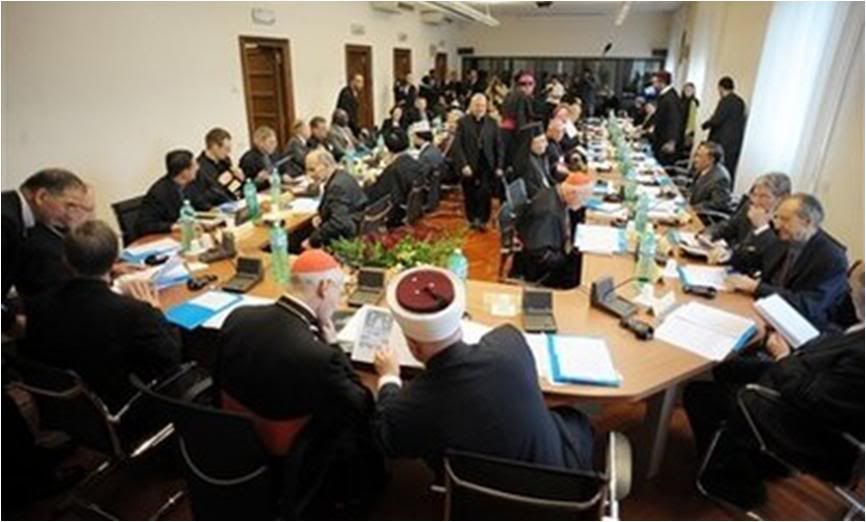 Photo taken before the opening session this morning. Cardinal Tauran and Muslim delegation head Mustafa Ceric are at the head of the confrence table.
Photo taken before the opening session this morning. Cardinal Tauran and Muslim delegation head Mustafa Ceric are at the head of the confrence table.
VATICAN CITY, Nov. 4 (AFP) – The Vatican's first-ever Catholic-Muslim forum kicks off Tuesday, two years after Pope Benedict XVI sparked outrage among Muslims for a speech seen as linking Islam with violence.
The three-day forum opens "a new chapter in the long history" of dialogue between the two faiths, the head of the Catholic delegation, Cardinal Jean-Louis Tauran, told the French Catholic daily La Croix.
Benedict will meet with the delegations on Thursday.
The Muslim side is led by the mufti of Bosnia, Mustafa Ceric, whose spokesman Yahya Pallavicini told AFP the delegates "represent no state and no ideological tendency."
The delegation includes Swiss-based intellectual Tariq Ramadan, an outspoken and controversial Muslim figure in Europe, along with Aref Ali Nayed of the Islamic Centre of Strategic Studies in Amman, Jordan, and Iranian ayatollah Seyyed Mustafa Manegheg Damad.
Several women in the delegation include Ingrid Mary Mattson, a professor of Islamic studies at the Hartford (Connecticut) Seminary in the United States.
The Vatican seminar was organised in response to a Muslim call for dialogue issued in October 2006, a month after Benedict's speech in Regensburg, Germany. [It was October 13, 2007 - 13 months after Regensburg. How can AFP make such a blatant mistake?]
The call titled "A Common World" was signed by 138 Muslim religious figures and scholars.
"Now that the shock waves touched off by Pope Benedict XVI's remarks ... have subsided, the overall consequences have proven more positive than negative," Ramadan commented in the British daily The Guardian's online edition.
"Above and beyond polemics, the Pope's lecture has heightened general awareness of their respective responsibilities among Christians and Muslims in the West," he added.
The Regensburg lecture sparked days of sometimes violent protests in Muslim countries, prompting the pontiff to say that he was "deeply sorry" for any offence and to attribute Muslim anger to an "unfortunate misunderstanding."
The closed-door discussions at the Vatican will focus Tuesday on "God's love" and Wednesday on "loving your neighbour," a theme that touches on two Vatican priorities, human rights and religious freedom. [Again, AFP has its wrong; The two 'commandments of love' are the subject today; tomorrow, it's the application to the principles of hman dignity adn mutual respect.]
The Vatican is however cautious over opening a purely theological dialogue, with Tauran telling La Croix: "We'll see ... how far we can go together."
Muslims and Christians differ in their concept of God, and follow "different paths to reach this God," said Tauran, the Roman Catholic Church's pointman for dialogue with Islam.
Islamic scholars arrive in Rome
for landmark Muslim-Catholic talks
By Eric Young

ROME, Nov. 3 - A team of Muslim scholars arrived in Rome Monday ahead of a landmark meeting with top Catholic officials.
The Muslim scholars, who will meet Pope Benedict XVI and Vatican officials for a series of talks starting Tuesday, hope the Nov. 4-6 meeting will help defuse ongoing tensions between Islam and Christianity.
"It is clear that the time has come to open debate on the common theological underpinnings and the shared foundations of the two religions," wrote Professor Tariq Ramadan, president of the European Muslim Network (EMN), in a commentary appearing in the U.K.-based Guardian. Ramadan is part of the delegation of Muslim scholars taking part in the first round of interfaith talks with the Vatican.
“Our task is not to create a new religious alliance against the ‘secularized’ and ‘immoral’ world order, but to make a constructive contribution to the debate, to prevent the logic of economics and war from destroying what remains of our common humanity,” the Brussels-based professor continued.
“Our task will be to assume our respective and shared responsibilities, and to commit ourselves to working for a more just world, in full respect of beliefs and liberties.”
It has been over two years since Catholic-Muslim relations notably soured following Pope Benedict XVI’s speech in Regensburg, Germany, in which he quoted a 14th century Byzantine emperor's criticism of Islam, linking it to violence.
One year earlier, violent protest broke out in Muslim countries after a Danish newspaper printed a series of cartoons of Islam’s most revered prophet, Mohammad. Over 50 people died in the ensuing deadly clashes, which some say could have been averted had Christians and Muslims jointly denounced the violence.
"We should develop a crisis reaction mechanism so if there is another cartoon crisis, we could get together and make a joint statement," said Ibrahim Kalin, an Islamic scholar from Turkey who is spokesman for the group attending this week’s closed-doors talks, according to Reuters.
Led by Mustafa Ceric, the Grand Mufti of Bosnia-Herzegovina, the 24 Muslim scholars attending the Nov. 4-6 gathering will represent the Common Word Group, a broad coalition of Muslim leaders and scholars who are pursuing dialogue between the world's two largest religions.
Since the group issued The Common Word Manifesto last October, a total 275 prominent Muslims have signed the document urging Christian churches to reach mutual understanding to safeguard global security, based on shared principles of loving God and their neighbors.
Common Word delegates have also met this year with a number of Protestant leaders, proposing regular dialogue sessions, student exchanges, suggested reading lists and other ideas to help Christians and Muslims learn more about each other.
At the most recent Muslim-Christian conference, hosted by the Archbishop of Canterbury, 17 prominent Muslims met with 19 Christian leaders and denounced the persecution of Iraqi Christians, saying that there was no justification in Islam for the attacks.
During their Oct. 12-15 meeting, participants addressed issues such as the global economic crisis, interfaith education, different understandings of scriptures, shared moral values, respect for foundational figures in the respective faiths, religious freedom, and the persecution of minorities in Iraq.
Pope Benedict, who will address the Rome gathering, is expected to deplore prejudice against Muslim minorities and immigrants in Europe while also calling on Muslims to help defend Christian minorities persecuted or endangered in the Middle East, including Iraq.
At the talks, Cardinal Jean-Louis Tauran, head of the Vatican's top interfaith body, the Pontifical Council for Inter-religious Dialogue, will lead the Catholic delegation that will be comprised of 24 Vatican officials and Catholic experts on Islam, including Miguel Angel Ayuso Guixot, president of Italy's top Islamic studies institute, the Pontifical Institute for Arabic and Islamic Studies (PISAI).
The team of delegates will meet on the theme of "Love of God and love of neighbor" and will address theological-spiritual themes on the first day.
On the second day, they will turn to "Human dignity," exploring issues related to human rights, religious freedom, and religious respect, possibly alluding to the freedom to convert and change religions.
And on Thursday, the delegates will have an audience with Pope Benedict before holding a public discussion session that afternoon.
The gathering concludes Thursday.
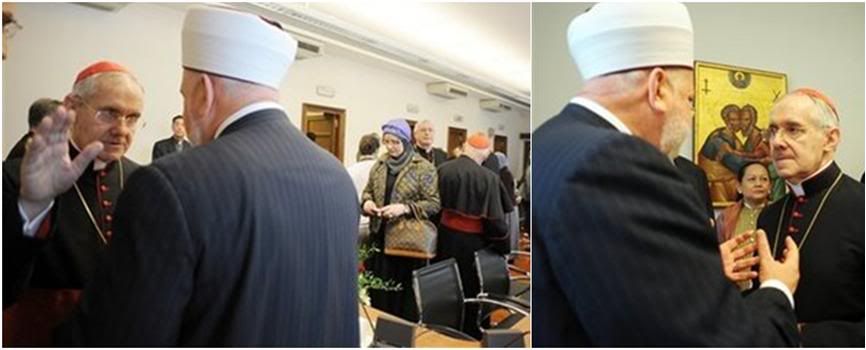 Cardinal Tauran and Mustafa Ceric before this morning's opening session of the Forum.
Who are the participants
Cardinal Tauran and Mustafa Ceric before this morning's opening session of the Forum.
Who are the participants
in the Forum sessions?

VATICAN CITY, Nov. 4 (Translated from Apcom) - An Iranian ayatollah, a Jordanian prince, and the Grand Mufti of Bosnia are among the Muslims taking part in the first convocation of the Catholic-Muslim Forum established last March to institutionalize dialog between thw two religions.
In the Catholic delegation, there are two cardinals (Tauran and McCarrick), along with representatives of various dicasteries of the Roman Curia, including the Congregation for the Doctrine of the Faith, and three Jesuit Islamologues.
The Muslim delegation, led by the Mufti of Bosnia-Herzegovina, Mustafa Ceric, and coordinated by Jordanian Parince Ghazi bin Muhammad bin Talal, has six 'no-shows' due to age and ill health.
The rest of the delegation includes a number of acdemics: Aref Ali Nayed (Libya), Seyyed Hossein Nasr (USA), Suleiman Abdallah Schleifer (Egypt), Anas Al-Shaikh-Ali (United Kingdom), Abderrahmane Taha (Morocco), Muhammad Sirajuddin Syamsuddin (Indonesia), Hamza Yusuf Hanson (USA), Abdal Hakim Murad Winter (United Kingdom), Ingrid Mary Mattson (Canada), Amina Rasul Burnardo, and controversial Islamologue Tariq Ramadan, who holds Swiss citizenship.
The Muslim authorities are the Iranian ayatollah Seyyed Mostafa Mohaghegh Ahmad; ex-Minister Mustapha Cherif of Algeria; Mohamed Bechari (France), secretary-general of the European Islamic Conference; Seyyed Javad Khoei (Iraq; Habib Faisal Al Kaff (Saudi Arabia), and Sohail Nakhooda (Portugal).
Italy-based Muslims are represented by Yahya Pallavicini, vice-president of COREIS (Comunità religiosa islamica) Prof. Adnane Mokrani (Tunisia), who teaches at the Pontifical Gregorian Unviersity; Ibrahim Kalin (Turkey), teaching assistant at the Gregorian; and Ahmad Gianpiero Vincenzo of the Associazione Intelletuali Musulmani.
The Catholic panel is headed by Cardinal jean-Louis Tauran, president of the Pontifical Council for Inter-Religious Dialog (CIRD). The members are Mons. Piero Celata, secretary-general and assistant secretary-general of the CIRD; Cardinal Theodore Edgar MaCarrick , emeritus archbishop of Washington; from the Roman Curia - Mons. Luis Ladaria, a Jesuit, secretary of the CDF; Mons. Antonio Vegliò, secretary of the Congregation for Oriental Churches; Fr. Francois Aki, from the same dicastery; Mons. Bernard Ardura, secretary of the Pontifical Council for Culture; Mons. Bernard Munono Muyembe of the Pontifical Council for Justice and Peace; Fr. Crispin Kimbeni of the Congregation for the Evangelization of Peoples; and Mons. Paul Hinder, Apostolic Vicar in Saudi Arabia; Bishops Jean-Clement Jeanbart (Syria), Louis Sako (Iraq), Michel Santier (France), and Andrew Francis (Pakistan); Jesuits and Islam scholars Christian Troll, Felix Koerner, and Samir Khalil; Miguel Angel Ayuso Guxot, president of the Pontifical Institute for Arabic and Islamic Studies (PISAI); Fr. Jean Marie Gaudeul, also fo PISAI; and Professors Emilio Platti (Belgium), Lamin Sanneh (USA), Jane Dammen McAuliffe (USA), Routraud Wielandt (Germany), Joseph Maila (France) and Francesco Botturi (Milano).
NB: The article parenthetically notes - without comment - three names who are not part of the Catholic panel, who were leading Vatican experts on Islam in the previous Papacy:
- the Jesuit priests Thomas Michel and Daniel Madigan [both of whom had harsh words for Benedict XVI over the Regensburg lecture, virtually accusing him of ruining everything that John Paul II had done to improve Muslim-Catholic relations - with Fr. Michel's line that "This (Regensburg) would never have happened under John Paul when we were there at the Vatican"]; and
- Mons. Michael Fitzgerald, former president of the CIRD, whom Benedict XVI reassigned to be Apostolic Nuncio to Egypt and observer-representative of the Holy See in the Arab League].
All three have been known to bend over backwards in accommodating Muslim views to the disadvantage of the Catholic position.
[Modificato da TERESA BENEDETTA 08/11/2008 00:19] |
 04/11/2008 23:43 04/11/2008 23:43 |
|
| | | OFFLINE | Post: 1.615 | Registrato il: 27/11/2005
| Utente Veteran | |
|
This Catholic-Muslim conference actually made it to the secular BBC news this morning and, of course, the two year old Regensburg lecture was trundled out again. It was only a brief news item, so I suppose I can't blame them for not explaining that the Regensburg lecture was not controversial at all - just misinterpreted by people who were not of the high intellectual calibre of Pope Benedict. |
 05/11/2008 01:26 05/11/2008 01:26 |
|
| | | OFFLINE | | Post: 15.581 | Registrato il: 28/08/2005
| Utente Gold | |
|
 The liturgical year in
The liturgical year in
the homilies of Benedict XVI:
Servant of a cosmic liturgy
by SANDRO MAGISTER
Translated from
the 11/5/08 issue of

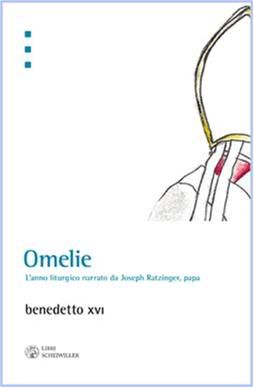 The book Omelie. L'anno liturgico narrato da Joseph Ratzinger, Papa (Milano, Scheiwiller, 2008, 280 pp, 18 euro) will be presented Wednesday evening, Nov. 5, in Rome at the Palazzo Valdino in Rome, bu Sandro Bondi, Italian Minister for Cultural Asset and Activities; Cardinal Camillo Ruini, emeritus Vicar-General of Rome – whose address we are printing in this issue [see below]; and by the editor of the book, Sandro Magister, whose Preface we are reprinting.
The book Omelie. L'anno liturgico narrato da Joseph Ratzinger, Papa (Milano, Scheiwiller, 2008, 280 pp, 18 euro) will be presented Wednesday evening, Nov. 5, in Rome at the Palazzo Valdino in Rome, bu Sandro Bondi, Italian Minister for Cultural Asset and Activities; Cardinal Camillo Ruini, emeritus Vicar-General of Rome – whose address we are printing in this issue [see below]; and by the editor of the book, Sandro Magister, whose Preface we are reprinting.
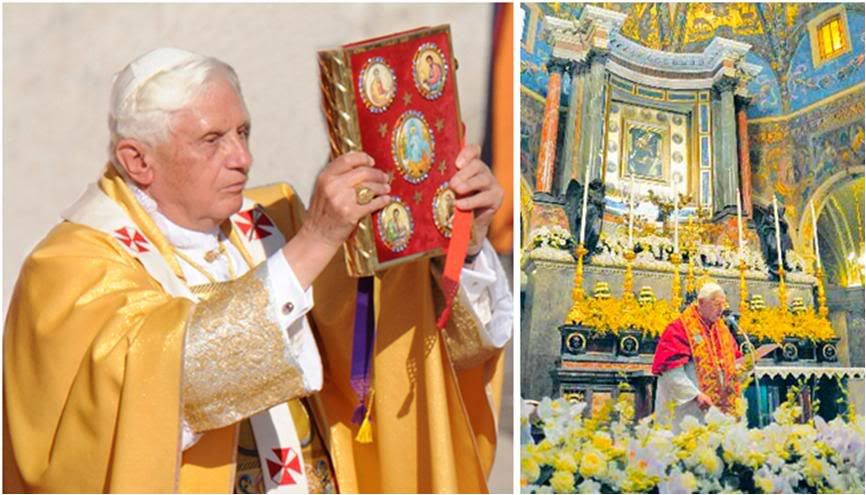
Liturgical homilies constitute are an important peak in the Pontificate of Benedict XVI. But the least known and least read. He has made waves worldwide with writings such as the Regensburg lecture, the book on Jesus, the encyclical on hope.
But much less, and too little, with the homilies that he addresses to the faithful in the Masses that he celebrates in public. And yet, without the homilies, the Magisterium of this theologian Pope would be incomprehensible. [That’s a rather sweeping statement to make! A serious deficiency to the average reader's awareness, yes, at the very least, but he has other ways of communicating his Magisterium.]
Just as without their homilies, one would not understand a St. Leo the Great, the first Pope whose liturgical preaching has come down to us, a St. Ambrose, a St. Augustine, and all those great pastor-theologians - pillars of the Church – who have been Joseph Ratzinger’s teachers.
First of all, his homilies are genuinely from Pope Benedict’s mind. He writes them all by hand, and sometimes, he even extemporizes. But above all, he imprints them with that unmistakable feature that distinguishes his homilies from any other act of his Magisterium – he makes it clear they are part of the liturgical act, that they constitute liturgy themselves.
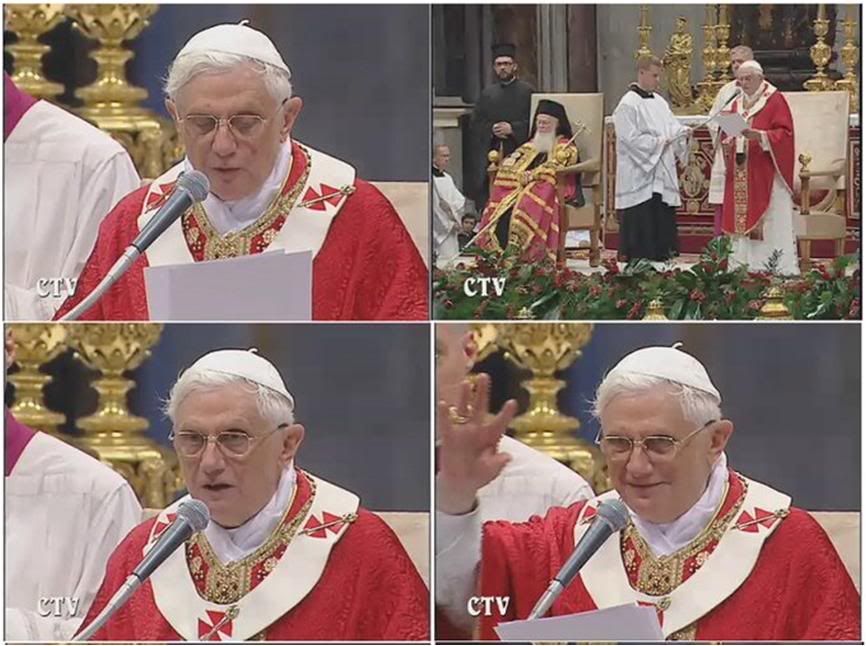
Benedict XVI clearly said so in his homily on June 29, 2008, on the Feast of Saints Peter and Paul: that his calling is to ‘serve as the liturgist of Christ for the people”. The ardent expression is St. Paul’s in Chapter 15 of the Letter to the Romans. Which the Pope has made his.
He has identified his mission as Successor of the Apostles precisely by considering himself the servant of a ‘cosmic liturgy’. Because “when the world in its entirety will have become a liturgy of God, then it will have reached its goal, then it will be safe and well”.
It’s a vertiginous vision. But Papa Ratzinger has this firm certainty: when he celebrates the Mass, he knows that in it, all of God’s action is woven into the ultimate destinies of man and the world.
For him the Mass is not a simple rite officiated by the Church. It is the Church itself, inhabited by the Trinitarian God. It is both the image and reality of the entire Christian adventure. The educated pagans of the first century were not wrong when they identified Christians by describing them in the act of celebration. This, too, was what the first Christians believed.
Sine dominico non possumus - without the Eucharist of Sunday, we cannot live – this was the response of the martyrs of Abitene in Africa to the Emperor Diocletian who prohibited them from worshipping. For this they sacrificed their lives.
Benedict XVI recalled this episode in the homily for the first Mass he celebrated outside Rome as Pope, on May 29, 2005, in Bari [where he closed the national Eucharistic Congress].
In that same homily, the Pope defined Sunday as the ‘weekly Easter’, thus identifying it as the axis of Christian time. Easter – which includes the passion, death and resurrection of Jesus – is a unique event in time, which took place once and for all, but it is also an act that is always being fulfilled, as St. Paul underscores in the Letter to the Hebrews.
This contemporaneity is realized in the liturgical act, where “the historical Easter of Jesus enters our present, and invests the life of those who celebrate it, and thus, enters the entire historical reality.”
As a cardinal, Ratzinger wrote evocative pages on ‘Church time’ in the book Introduction to the spirit of liturgy - a time, he wrote, “in which past, present and future compenetrate and touch eternity”.
The rhythm and seasons of Church time are dictated by Sundays. It is ‘the first day of the week’ (Mt 28,1), and therefore, the first of the seven days of creation. But it is also the eighth day of the new time, which began with the Resurrection of Jesus.
Thus, Sunday is, for Christians, ‘the true measure of time, the unit of measure of their life’, because ‘the new Creation’ bursts anew in every Sunday Mass, in which, every time, the Word of God becomes flesh.
This is shown in the paintings found in medieval and Renaissance churches: on the one side, the angel of the Annunciation, on the other, the Virgin to whom the announcement is made, and in the center, the altar on which, in every Mass, Verbum caro factum est – the Word is made flesh - by the Holy Spirit.
But even the structure of the Mass makes this crystal clear, as Pope Benedict pointed out in his comment on the supper of the Risen Christ with the disciples at Emmaus, in the Sunday Angelus on April 6, 2008.
The first part of the Mass is listening to Sacred Scripture [the Liturgy of the Word], and the second is “the liturgy of the Eucharist, and communion with Christ present in the Sacrament in Body and Blood”. The two banquets – of the Word and of Bread – are indissolubly connected.
The homily is the bridge between the two. The model is Jesus in the Synagogue at Capharnaum, in Chapter 4 of the Gospel of St. Luke. After Jesus rolled up the scroll (from which he had read Scripture), “the eyes of all in the synagogue were fixed intently on him’. And he told them: "Today this scripture passage is fulfilled in your hearing."
In his homilies, Pope Benedict does the same thing. He comments on the Scriptures and says that ‘today’, they are fulfilled in the Eucharistic act that is being celebrated. With its consequent reverberation in the life of everyone because, he has written, “celebration is not just ritual, it is not a liturgical game, if is intended to be ‘ logike latreia’, the transformation of my existence in the direction of the Logos, the interior contemporaneity between Christ and myself”.
The Scriptures illustrated by Benedict XVI in every homily are naturally those of the Mass of the day, which give the day its imprint. What comes into play here is the other great articulation of Church time, which is the cycle of the liturgical year.
On the basic rhythm set by Sunday Mass, a second rhythm was imposed by Christians from the very first century, with an annual cyclicity, having Easter as its pivot, and Christmas and Pentecost as the two other centers of gravity.
This second rhythm allows the Christian mystery to shine in the distinct aspects and moments of its entire sacred history (the history of the faith). It starts with the weeks of Advent, to Christmas time and the Epiphany, the 40 days of Lent, Easter, the 50 days of Eastertide, and Pentecost.
The Sundays outside these ‘high’ seasons are called the Sundays of ordinary time. Then there are the great holidays celebrating Ascension, the Trinity, Corpus Domini, Saints Peter and Paul, the Assumption, the Immaculate Conception.
But the liturgical year is much more than just the serial narration of the one great story and its protagonists. Advent, for instance, is not just a commemoration of the waiting for the Messiah, because he has already come, and will come again at the end of time.
Lent is preparation for Easter, but also for Baptism, as the matrix of Christian life for everyone, the sacrament that was administered in ancient times during the Easter vigil.
The human and the divine, time and eternity, Christ and the Church, the experiences of everyone and of each one, are surprisingly interwoven in every moment of the liturgical year.
This is affirmed in a wonderful antiphon for the Feast of the Epiphany: “Today the Church is joined to the celestial spouse, because in the Jordan, Christ washed her sins. The Magi hurry with their gifts to the royal wedding, and the guests rejoice because the water has been turned to wine.”
The Magi, the baptism of Jesus in the Jordan, the marriage at Cana - everything becomes an ‘epiphany’, a manifestation of the nuptial union between God and man, of which the Church is the sign. and the Eucharist is the Sacrament.
This book puts together for the first time a cycle of homilies by Benedict XVI. They cover the liturgical year which starts with the first Sunday of Advent in 2007, or more precisely, with the Vespers on the eve of that First Sunday. This first homily and that on December 31, 2007, were delivered by the Pope at Vespers, before the Magnificat.
All the others were delivered at Mass, after the Gospel. Most of them were delivered at St. Peter’s – in the Basilica or on the Square; one in the Sistine chapel; one at St. John Lateran; one at St Paul outside the Walls; four in other churches of Rome; one in Castel Gandolfo; one in Albano; the rest in other Italian or foreign cities during a visit – New York, Genoa, Brindisi, Sydney, Cagliari and Paris.
On two occasions, Benedict XVI, besides celebrating Mass, also administered Baptism to children and adults. Once, he gave Confirmation to young people. Once, he ordained priests. Another time, he consecrated oils for the administration of sacraments. Once he consecrated a new parish church, and in another parish, a new altar. In all these special cases, the Pope also devoted part of the homily to illustrate the specific acts.
Three times, the Mass was preceded or followed by a procession: on Ash Wednesday, on Palm Sunday, and on Corpus Domini. On the evening of Maundy Thursday, the Pope washed the feet of 12 Roman men. On Easter night, he presided at the liturgy of light, with the lighting of the Easter candle and the singing of the Exultet.
On June 29, the Feast of Saints Peter and Paul, the Ecumenical Patriarch of Constantinople, Bartholomew I, participated with the Pope at Mass – but not at the Consecration nor did he receive Communion, but he did take part in the homily, speaking before the Pope. [The technical description given by Vatican Radio at the time is that "the Patriarch participated fully in the Liturgy of the Word but not in the Liturgy of the Eucharist", at which he was an onlooker, However, he rejoined the Pope for the Final Blessing, which he also gave in Greek. I’m surprised Magister missed this.]
In any case, Benedict XVI always based his homilies on the Scriptural passages read during the Mass of the Day, or at Vespers. The reader will find the readings at the end of each homily – an indispensable accessory to situate the homily in its liturgical context. The passages almost always coincide with the readings from the Roman Missal as proclaimed that day in almost all the Catholic churches around the world.
After the homilies for the Vespers of the first Sunday of Advent and December 31st, the reader will also find the texts of the Magnificat and the Te Deum.
When read continuously, the homilies cover the liturgical year, and thus the Christian mystery, with exemplary clarity. There are a few gaps here and there, because the Pope does not celebrate a public Mass on most Sundays and feast days. But he himself fills up these gaps by dedicating the messages he delivers to the faithful and to the world on Sundays at noon, before praying the Angelus (or the Regina caeli, at Eastertide), to the Scripture of the day.
These messages are often mini-homilies in which Benedict XVI comments on the reading for the Mass of the day. They are unmistakably in his own writing and are true gems of minor homiletics.
In the appendix, the reader will find a collection of some of these mini-homilies, which will further enrich the vision of that masterpiece which is the liturgical year narrated by Pope Benedict.
NB: Magister today has also posted the Preface and translations on in his regular site
 chiesa.espresso.repubblica.it/articolo/209107?eng=y
along with the text of the Pope's homily on the Feast of Assumption, given at the parish church of Castel Gandolfo on August 15, 2007, a homily that was extemporaneous,and that is not included in his book.
chiesa.espresso.repubblica.it/articolo/209107?eng=y
along with the text of the Pope's homily on the Feast of Assumption, given at the parish church of Castel Gandolfo on August 15, 2007, a homily that was extemporaneous,and that is not included in his book.
My translation of the homily is on
freeforumzone.leonardo.it/discussione.aspx?idd=354537&p=16
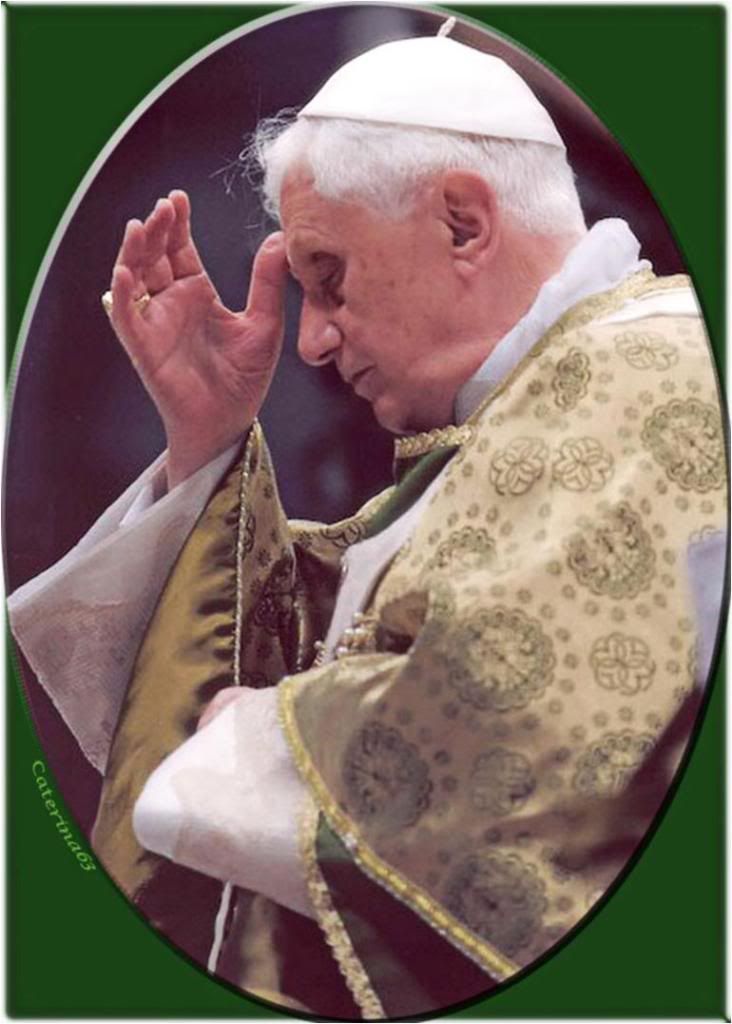 The spirit of liturgy: A new photo-portrait executed by Caterina
The spirit of liturgy: A new photo-portrait executed by Caterina
between exegesis and theology
by CARDINAL CAMILLO RUINI
Translated from
the 11/5/08 issue of

To frame and understand the significance, the objectives and the personal and existential context of the homilies of Benedict XVI, it is very important to read the Preface which he himself wrote for the first volume of his Opera omnia, which came out recently in German, with the Italian edition coming in a new months.
The Pope explains above all why he chose that the first volume to come out should be his writing on liturgy, conforming to the order followed by the Second Vatican Council, whose first Constitution was that on liturgy.
Benedict XVI wrote: "The liturgy of the Church has been, for me, from childhood, the central activity of my life, and became, in the theological school of teachers like Schmaus, Söhngen, Pascher e Guardini, also the center of my theological work".
He explains that he chose fundamental theology as the specific subject of his teaching because he "wanted above all to go to the very depths of the question: why do we believe?", a question which also includes "the other question on the right reply to give God, and therefore, also the question of divine service", which is, liturgy.
He adds: "It is from this perspective that my works on liturgy should be understood. The specific problems of liturgical science did not interest me, but rather, always the anchorage of liturgy in the fundamental act of our faith, and therefore, its place in our entire human existence".
And so, his interest became centered on three fundamental areas concerning liturgy: the relationship between the Old and New Testaments, the relationship with the religions of the world, and the cosmic character of liturgy, "which represents something more than the simple gathering, great or small, of human beings. Liturgy, in fact, must be celebrated within the breadth of the cosmos, embracing creation and history at the same time".
Sandro Magister, in his Preface, cites in this regard the homily given by Benedict XVI on June 29 this year for the Feast of the Apostles Peter and Paul, in which the Pope cites Verse 1,6 from the Letter to the Romans, where Paul himself expresses the essence of his mission, saying he was called "to be a minister [leitourgos] of Christ Jesus to the Gentiles in performing the priestly service of the gospel of God, so that the offering up of the Gentiles may be acceptable, sanctified by the holy Spirit".
Magister maintains, rightly, that in those words of St. Paul, Benedict XVI identifies his own vocation and mission, and he also specifies the distinctive feature of the homilies with respect to the rest of the Pope's Magisterium: in that the homilies "are part of a liturgical act, they are liturgy themselves".
In truth, Joseph Ratzinger/Benedict XVI - not only because of his profound sense of liturgical mystery and therefore of liturgical action - is on all counts extraordinarily equipped. and so to speak, particularly 'oriented', for the ministry of preaching.
In his extemporaneous intervention on October 14 at the Bishop's Synod on the Word of God, he maintained that the lack of a hermeneutic of faith in present exegesis - replaced by a profane philosophical hermeneutic 'which negates the possibility of the entry and real presence of the Divine in history" - provokes "a form of perplexity even in the preparation of homilies".
In fact, he added, "where exegesis is not theology, Scripture cannot be the soul of theology, and vice versa, where theology is not essentially the interpretation of Scripture within the Church, then such a theology no longer has a foundation."
That is why, for the life and mission of the Church and for the future of the faith, it is absolutely necessary, he said to overcome the dualism between exegesis and theology.
Before he affirmed it as Pope, Joseph Ratzinger as a theologian had put into practice this intimate unity between exegesis and theology .
In his book La mia vita ( Milestones, in English], referring to the profound diversity between his theology and that of Karl Rahner, he wrote: "For my part, my whole intellectual formation had been shaped by Scriptures and the Fathers, and profoundly historical thinking" (p. 129, Milestones).
This essentially Biblical, patristic, liturgical and historical character of his theology has made of Joseph Ratzinger-Benedict XVI an extraordinary homiletist and catechist who, with the simplicity and substance of his words, in a way comprehensible to everyone, breaks the bread, for all of us, of the Word of God and the mystery of our salvation.
I wish to add a specification to avoid the risk of any equivocation. The essentially historical temperament of Ratzinger the theologian must not be understood at all as a historical approach which leaves the words of Sacred Scripture closed in the past when they were written.
On the contrary, as he himself amply explains in the book JESUS OF NAZARETH, in the words of the past, one can and must perceive the question about one's present: in the words of man, specifically that of the single sacred Author, something greater resounds - God who makes his true face known for our salvation.
In fact, Joseph Ratzinger elaborates and brings alive the great patrimony of Biblical and ecclesial faith in a fecund interchange with the great problems of our time, a faith whose sense, origins and dynamism he profoundly grasps.
That is why his homilies, like his theological works and his magisterial interventions, interpellate and involve us, peoviding light and nourishment for our journey through life.
Concretely, the homilies collected in this volume show how the texts of the Biblical readings in each liturgical celebration can be understood in their full and authentic significance, historical as well as theological, as an integral part of the liturgical act; and how in such fullness, they continue to live in the faith and speak to us.
That is why reading and meditating on the homilies of Benedict XVI has become for many priests a precious aid and almost a paradigm for their personal homiletic preaching. In this respect, I myself have experienced how, having heard most of these homilies when they were delivered, they have helped my own preaching, insofar as I could improve Biblical and liturgical associations to stimulate the attention and participation of the assembly.
This book is a practical aid that every priest can easily acquire as a model for inspiration in his own homilies, not through repetition or servile imitation, but as reference point for one's personal commitment in assimilating and communicating the Word of our salvation.
 I beg your indulgence for a personal note that is relevant to all this.
I beg your indulgence for a personal note that is relevant to all this.
As one who has had the unparalelled pleasure of translating regularly over the past three years much of what the Holy Father says and writes, I have a profound and widening personal experience of what it means to be exposed so thoroughly to his thinking.
Because of time considerations, and as a way of deepening my own process of personal discovery - the unfolding of each particular thought of the Holy Father as expressed in individual occasions - I have found that the most rewarding way to translate his texts is to do so line by line, without reading through the entire text first. And this is possible and easy because his thought flows and is expressed so linearly, without convolutions.
After I have translated the last line of the particular piece, I then go over the whole translation to correct spelling errors and adjust where necessary to make phrases more idiomatic or use a more appropriate word, referring back to the original text as needed.
After I have cleaned it up this way, I go back and read the entire original text for its unfiltered impact. Then I can re-read through my entire translation and make sure that it all holds together, and is as faithful to the original text as it can possibly be. [I use the New American Bible for translations of the Scriptures he cites, and I use equivalent English idioms instead of literal translations for transitional passages or comments, as necessary, without affecting or violating the substance and spirit of the text.]
The process means going through an individual text word for word at least four times. When the text is as rich and as beautiful as the Holy Father writes, the spiritual and intellectual pleasure of the task is ineffable and immeasurable.
It is as if I am receiving now all the religious instruction on the meaning of Scriptures that I never had, and at the feet of someone who is equipped to do this as no other living person is. Every new text is an education for me.
And that is why I live to translate each text as it comes along, when they are his homilies, catecheses, spiritual messages, or extemporaneous discourses. Each translation task becomes a spiritual experience that provides me with fresh inspiration and Christian zeal.
For this, I am thankful to the Forum, because otherwise, I would never have to write out translations and experience the Holy Father's thought in such an involved way - which is different, but not any less exhilarating than listening to him deliver his texts, or even just re-reading his original texts, which I often do aloud, believe it or not.
[Modificato da TERESA BENEDETTA 05/11/2008 18:26] |
 05/11/2008 13:02 05/11/2008 13:02 |
|
| | | OFFLINE | | Post: 15.583 | Registrato il: 28/08/2005
| Utente Gold | |
|

OR today.
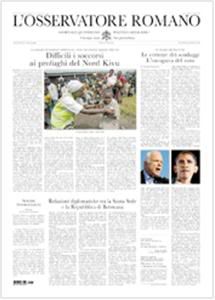 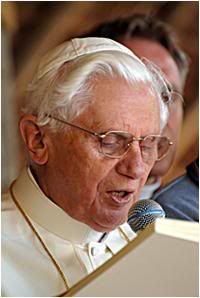
No Papal stories on Page 1, but a teaser for a doubleheader
in the inside pages - the Preface to Sandro Magister's new book
putting together the Holy Father's homilies in the liturgical year
2007-2008, and Cardinal Ruini's commentary on it (both translated
in the preceding post).
The main story on Page 1 is the difficulty of bringing aid to the refugees of
North Kivu (Democratic Congo); and editorial commentary on the US elections
(written early on Election Day), and diplomatic relations established between
the Holy See and Botswana. Strangely, there is no story on the opening day
of the Catholic-Muslim Forum.
THE POPE'S DAY
General Audience today.
[Modificato da TERESA BENEDETTA 07/11/2008 00:42] |
 05/11/2008 13:31 05/11/2008 13:31 |
|
| | | OFFLINE | | Post: 15.584 | Registrato il: 28/08/2005
| Utente Gold | |
|
 GENERAL AUDIENCE TODAY
GENERAL AUDIENCE TODAY
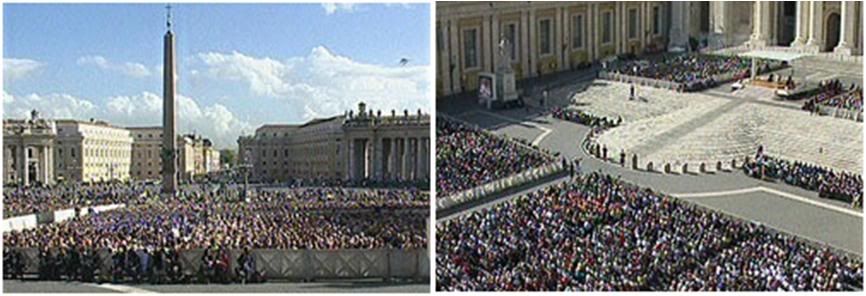
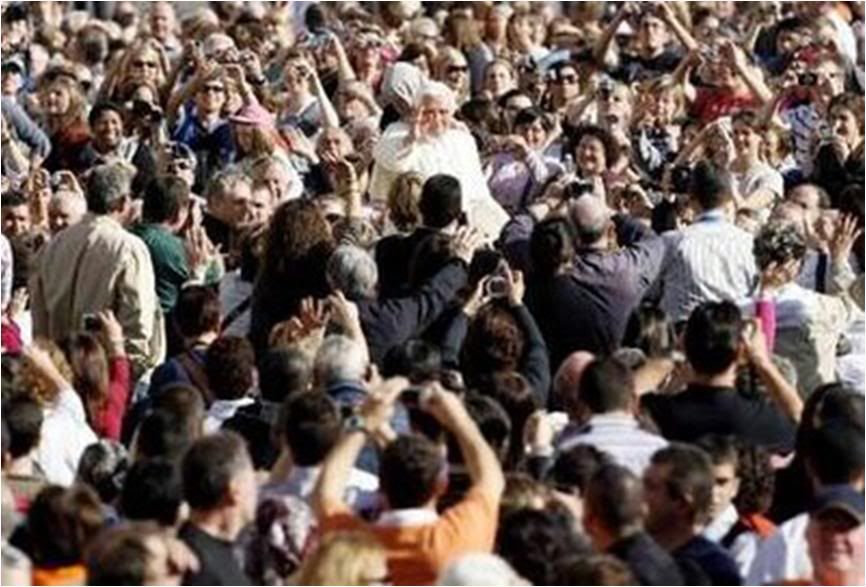
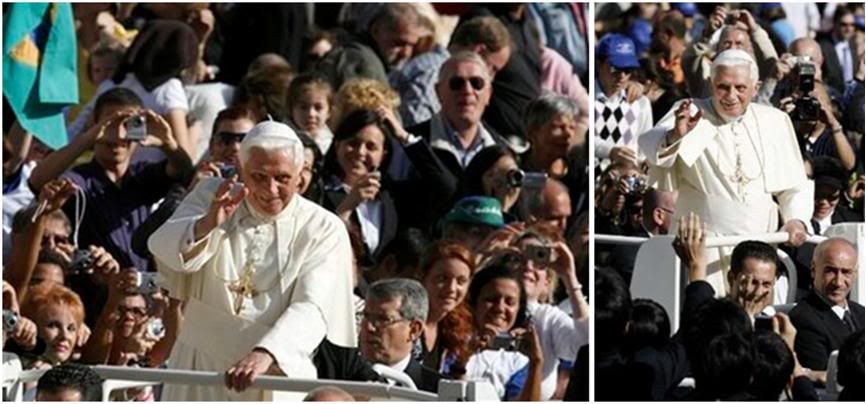
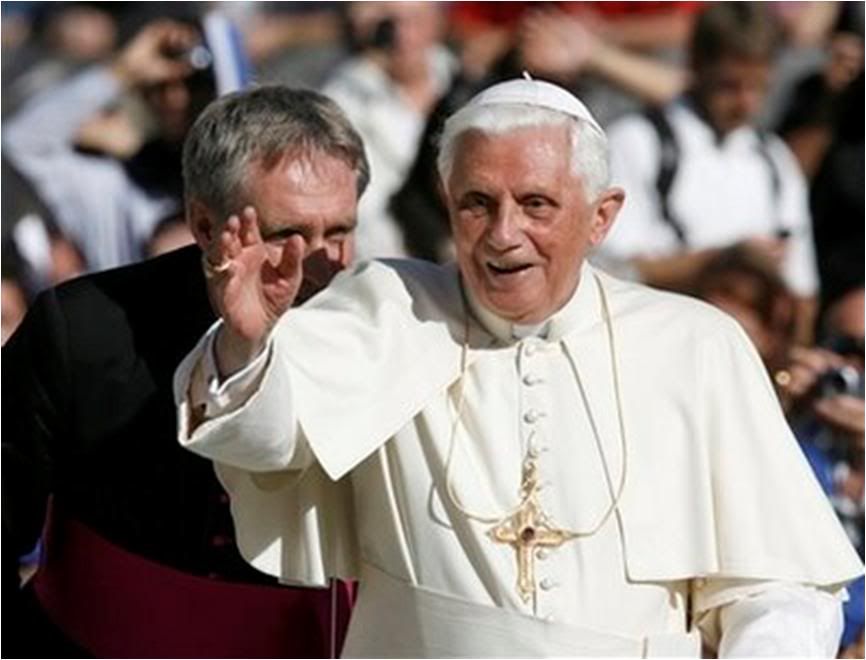
The Holy Father spoke today on the Resurrection in the preaching of St. Paul "without which the idea of eternal life would be absurd'.
Here is how he synthesized it in English:
In our continuing catechesis on the teaching of Saint Paul, we now turn to his proclamation of the resurrection. In preaching Jesus Christ risen from the dead, Paul was concerned to "hand on" what he himself had "received" from the Apostles (cf. 1 Cor 15:3).
He proclaims not only the fact of the resurrection, but its vital significance: in Christ, who died and rose for us, we have been saved, made righteous in the sight of God.
The resurrection reveals Jesus’s true identity as the eternal Son of God and Lord of the living and the dead. We, for our part, are called to become fully configured to him in the mystery of his passover from death to life.
Our present sufferings thus become a sharing in Christ’s own suffering and death, while the hope of the resurrection even now draws us toward the fullness of life with all the saints in his Kingdom.
Salvation, Paul tells us, comes from confessing with our lips that Jesus is Lord, and believing in our hearts that God raised him from the dead (cf. Rom 10:9).
With the Apostle, then, let us strive ever more fully, in faith and hope, "to know Jesus Christ and the power of his resurrection" (cf. Phil 3:10).
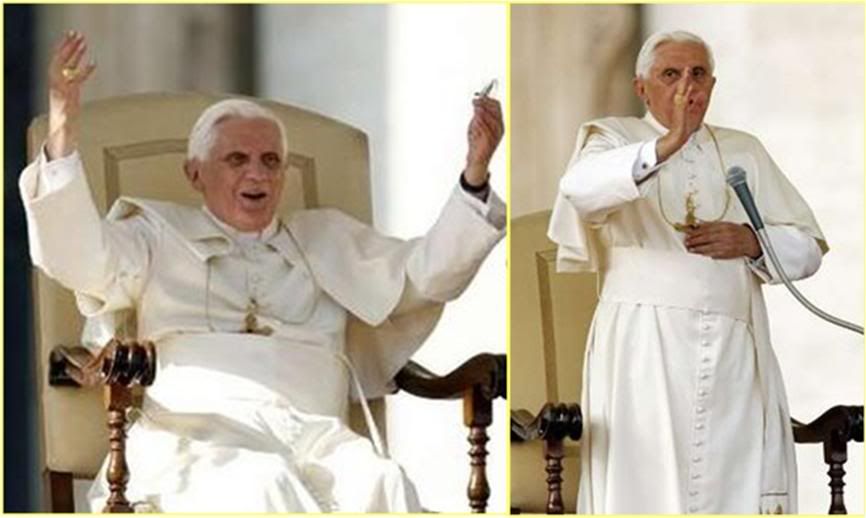
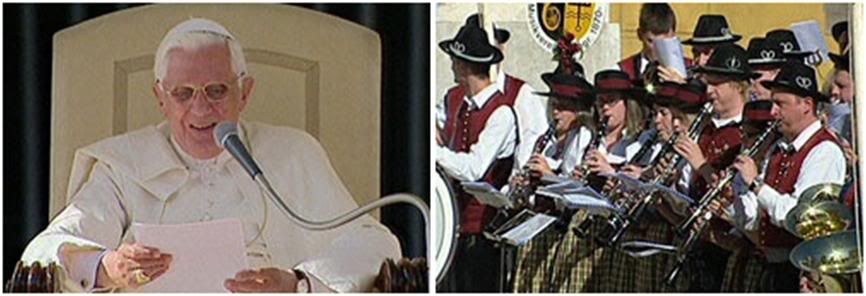
 Here is a full translation of the catechesis today.
Here is a full translation of the catechesis today.
THE HOLY FATHER'S CATECHESIS
#11 Catechetical Cycle for the Pauline Year
Dear brothers and sisters,
"If Christ has not been raised, then empty (too) is our preaching; empty, too, your faith... (and) you are still in your sins." (1 Cor 15,14-17).
With these powerful words in the first Letter to the Corinthians, St. Paul makes us understand the decisive importance that he attributed to the resurrection of Jesus.
In fact, in that event is the solution to the problem posed by the tragedy of the Cross. By itself, the Cross cannot explain the Christian faith, but would simply remain a tragedy, an indication of the absurdity of being.
The Paschal mystery consists in the fact that the Crucified One "was raised on the third day in accordance with the scriptures" (1 Cor 15,4) - as early Christian tradition affirmed.
This is the master key to Pauline Christology: everything turns around this center of gravity. The entire teaching of the Apostle Paul always starts from and arrives at the mystery of He whom the Father raised from the dead.
The Resurrection is a fundamental fact, almost like a previous axiom (cfr 1 Cor 15,12) ['But if Christ is preached as raised from the dead, how can some among you say there is no resurrection of the dead?'], on the basis of which Paul could formulate his announcement (kerygma) in brief: He who was crucified, who thus manifested the immense love of God for man, is resurrected and lives in our midst.
It is important to grasp the connection between the announcement of the Resurrection as Paul formulated it, and that which was in use by the first pre-Pauline Christian communities. Here we can really see the importance of the tradition that preceded the Apostle and that he, with great respect and attention, wished in his turn to transmit.
The text on the Resurrection, contained in Chapter 1, verses 1-11, of the first letter to the Corinthians, highlights very well the nexus between 'receiving' and 'transmitting'.
[For convenience, here is the text cited, from the New American Bible:
1 Now I am reminding you, brothers, of the gospel I preached to you, which you indeed received and in which you also stand.
2 Through it you are also being saved, if you hold fast to the word I preached to you, unless you believed in vain.
3 For I handed on to you as of first importance what I also received: that Christ died for our sins in accordance with the scriptures;
4 that he was buried; that he was raised on the third day in accordance with the scriptures;
5 that he appeared to Cephas, then to the Twelve.
6 After that, he appeared to more than five hundred brothers at once, most of whom are still living, though some have fallen asleep.
7 After that he appeared to James, then to all the apostles.
8 Last of all, as to one born abnormally, he appeared to me.
9 For I am the least 4 of the apostles, not fit to be called an apostle, because I persecuted the church of God.
10 But by the grace of God I am what I am, and his grace to me has not been ineffective. Indeed, I have toiled harder than all of them; not I, however, but the grace of God (that is) with me.
11 Therefore, whether it be I or they, so we preach and so you believed.
St. Paul places great importance on the literal formulation of tradition. At the end of the passage mentioned, he underscores: "Whether it be I or they, so we preach and so you believed" (1 Cor 15,11), thus bringing to light the unity of the kerygma, the announcement for all believers and for all those who will announce the resurrection of Christ.
The tradition he refers to is the source he draws from. The originality of his Christology is never at the expense of faithfulness to tradition. The kerygma of the Apostles always precedes Paul's personal re-elaboration. Every argument of his proceeds from the common tradition which expresses the faith shared in all the churches who are but one Church.
Thus, Paul offers a model for all time on how to make theology and how to preach. The theologian, the preacher, does not create new visions of the world and of life, but is at the service of the real facts of Christ, the Cross, the resurrection. His task is to help us understand today, behind the ancient words, the reality of 'God-with-us', and therefore, the reality of true life.
It is a good opportunity to clarify here that St. Paul, in announcing the resurrection, is not concerned with presenting an organic doctrinal exposition of it - he did not intend to write a manual of theology - but confronts the subject by responding to the concrete doubts and questions that the faithful brought him, through discourses dictated by circumstances but full of lived faith and theology.
We find in them a focus on the essential fact that we are 'justified', that is, we are 'made just' and saved, by Christ who died and resurrected for us.
What emerges above all is the fact of the Resurrection, without which Christian life would simply be absurd. On that Easter morning, something extraordinary happened, something new, which was at the same time, very concrete, marked by very precise signs, and reported by many witnesses.
Even for Paul, as for the other authors of the New Testament, the resurrection is linked to the testimony of those who had a direct experience of the resurrected Christ. It meant seeing and feeling not only with the eyes and other senses, but also with an interior light which urges acknowledgment of that which the external senses attest to be objective fact.
Thus Paul, like the four Gospels, gives a fundamental importance to the apparitions [of the risen Christ] which are a basic condition for faith in the Resurrected One who had left his tomb empty.
These two facts are important: the tomb was empty, and Jesus really appeared [to his disciples] afterwards. That is the chain of tradition which, through the testimony of the Apostles and the first disciples, has reached down to successive generations and to us.
The first consequence, or the first way to express this testimony, was to preach the resurrection of Christ as a synthesis of the Gospel announcement and as the culmination of a salvific itinerary.
Paul does all this on different occasions: if we consult the Letters and the Acts of the Apostles, we can see that the essential point for him always was to bear witness to the resurrection.
I wish to cite just one text. Paul, arrested in Jerusalem, stands before the Sanhedrin as an accused person. On this occasion when life and death were at stake for him, he indicates the sense and the content of all his preaching: "(I) am on trial for having hope in the resurrection of the dead" (Acts 23,6).
Paul will repeat this refrain in his Letters (cfr 1 Ts 1,9sl 4,13-18; 5,10), in which he refers to his own personal experience, his personal encounter with the Risen Christ (cfr Gal 1,15-16; 1Cor 9,1).
But we may ask: What was the profound sense of the Resurrection event for Paul? What does he tell us at a distance of 2000 years? Is the affirmation :Christ is risen" actual even for us? Why is the resurrection, for him and for us, a topic that should be so determinative?
Paul solemnly gives an answer to this question at the start of the Letter to the Romans, where he begins by referring to "the gospel of God... the gospel about his Son, descended from David according to the flesh, but established as Son of God in power according to the spirit of holiness through resurrection from the dead" (Rm 1,3-4).
Paul knows well and says so many times that Jesus was always the Son of God, from the moment of his incarnation. The novelty of the Resurrection is in the fact that Jesus, elevated from the humility of his earthly existence, becomes established as the Son of God 'in power'.
The Jesus who was humiliated to the point of death on the Cross can therefore say to the Eleven: "All power in heaven and on earth has been given to me" (Mt 28,18). Psalm 2,8 has been realized: "Only ask it of me, and I will make your inheritance the nations, your possession the ends of the earth" (Ps 2,8).
That is why the announcement of the Gospel of Christ to all the peoples starts with the Resurrection. With it begins the Kingdom of Christ, the new Kingdom which knows no other power but that of truth and love.
Thus the Resurrection definitively reveals the authentic identity and the extraordinary stature of the Crucified One - an incomparable and supreme dignity: Jesus is God.
For St. Paul, the secret identity of Jesus, more than in the Incarnation, is revealed in the mystery of the resurrection. While the title of Christ, which means Messiah, 'the anointed one', tends to be, in Paul, the proper name of Jesus, and the title of 'Lord' specifies his personal relationship with believers, now the title 'Son of God' illustrates the intimate relationship of Jesus to God, a relationship which is fully revealed in the Paschal mystery.
Thus, it can be said that Jesus was resurrected to be the Lord of the living and the dead (cfr Rm 14,9; 2 Cor 5,15), or in other words, our Savior (cfr Rm 4,25).
All this is pregnant with important consequences for our life of faith: we are called to take part to the very depth of our being in the whole experience of the death and resurrection of Christ.
The Apostle says: "We have died with Christ" and "We believe that we shall also live with him, (knowing) that Christ, raised from the dead, dies no more; death no longer has power over him" (Rm 6,8-9).
This translates to a sharing in the suffering of Christ, which precedes that full configuration with him, through the resurrection which we look forward to with hope.
This is what happened even with St. Paul, whose personal experience is described in his Letters with such heartfelt but equally realistic tones: "To know him and the power of his resurrection and (the) sharing of his sufferings by being conformed to his death, if somehow I may attain the resurrection from the dead" (Phil 3,10-11; cfr 2 Tm 2,8-12).
The theology of the Cross is not a theory - it is the reality of Christian life. To live in our faith in Jesus Christ, to live truth and love, implies renouncing daily, it implies suffering.
Christianity is not a way of convenience, but a demanding ascent, though one illuminated by the light of Christ and the great hope that is born with him.
St. Augustine says that Christians are not spared from suffering - indeed, a little more of it falls to them, because to live the faith is to express courage in facing life and history more deeply.
Nonetheless, it is only in this way, in experiencing what it is to suffer, that we can know life in its depth, in its beauty, and in the great hope inspired by Christ crucified and resurrected.
Thus, the believer find himself between two poles. On the one hand, the resurrection which in some way is already present and working in us (cfr Col 3,1-4; Eph 2,6); on the other, the urgency of inserting ourselves into that process that leads everything and everyone towards fullness, described in the Letter to the Romans with a daring image: as all creation moans and suffers something like the pain of childbirth, so do we moan in expectation of the redemption of our bodies, of our own redemption and resurrection (cfr Rm 8,18-23).
In summary, we can say with Paul, that the true believer obtains salvation, professing with his own mouth that Jesus is the Lord, and believing in his heart that God has resurrected him from the dead (cfr Rm 10,9).
What is important, first of all, is the heart that believes in Christ and which, in the faith, 'touches' the Resurrected Lord. But it is not enough to carry faith in one's heart - we should confess it and testify to it with our mouth, with our life, thus rendering present the truth of the cross and the resurrection in our history.
This is the way, in fact, whereby the Christian places himself within that process thanks to which the first Adam, earthly and subject to corruption and death, becomes transformed into a new Adam, who is heavenly and incorruptible (cfr 1 Cor 15, 20-22,42-49).
This process began with the resurrection of Christ, on which we base the hope of being able ourselves one day to enter with Christ into our true homeland in heaven. Sustained by this hope, let us proceed with courage and with joy.
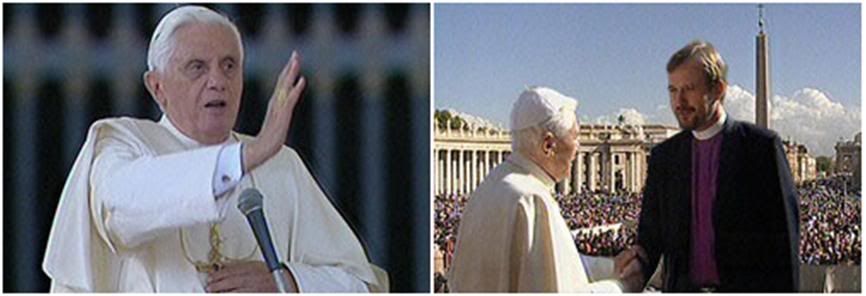

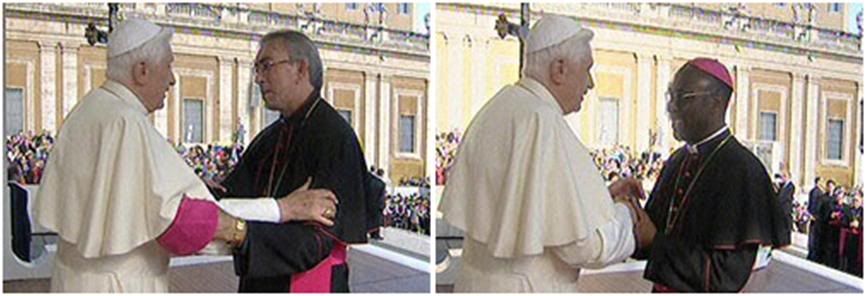
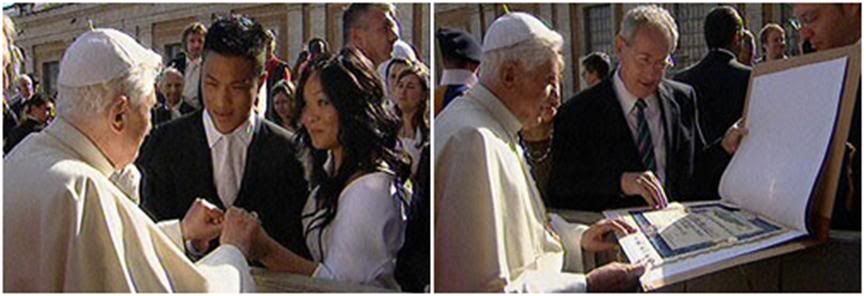
[Modificato da TERESA BENEDETTA 05/11/2008 18:28] |
 05/11/2008 17:18 05/11/2008 17:18 |
|
| | | OFFLINE | | Post: 15.586 | Registrato il: 28/08/2005
| Utente Gold | |
|
 Pope offers prayers
Pope offers prayers
for US President-elect
Translated from
the Italian service of

Pope Benedict XVI has sent, through the United States embassy to the Holy See, a message to President-elect Barack Obama in to congratulate him and his family, calling his election a historic occasion.
He assured him of his prayers that God may assist him in his great responsibilities to the United States and to the international community.
This was disclosed to newsmen by Fr. Federico Lombardi, Vatican press director.
He said that the Holy Father invokes God's blessings on Obama and the American People so that all men of good will may work together to build a world of peace, brother hood and justice.
Fr. Lombardi earlier made this statement:
"The task of the President of the United States is one of immense and supreme responsibility not only for his country but for the whole world, given the weight that the United States has in all fields on the world scene.
"That is why we all wish that the new President to be may be able to respond to the expectations and hopes placed on him, by effectively serving law and justice, and finding the right ways to promote peace in the world, favoring the growth and the dignity of persons with respect for the essential human and spiritual values.
"The faithful pray that God may enlighten him and assist him in his supreme responsibility.
[Modificato da TERESA BENEDETTA 05/11/2008 17:19] |
 06/11/2008 01:19 06/11/2008 01:19 |
|
| | | OFFLINE | | Post: 15.592 | Registrato il: 28/08/2005
| Utente Gold | |
|
 Oxford conference on Scripture and liturgy
Oxford conference on Scripture and liturgy
in the theology of Benedict XVI
By Karna Swanson

OXFORD, England, NOV. 4, 2008 (Zenit.org).- Before the divisions over the liturgical reforms of the Second Vatican Council can be healed, liturgy needs to be more fully understood and lived, concluded a congress held at Oxford University.
The one-day congress on "Scripture and Liturgy in the Theology of Benedict XVI" took place Saturday at the Catholic chaplaincy of the university.
Nearly 300 attended the event sponsored by the St. Paul Center for Biblical Theology, founded and directed by Scott Hahn, professor of theology and Scripture at Franciscan University of Steubenville.
The Center for Faith and Culture in Oxford, the U.K. outreach program of Thomas More College in New Hampshire, organized the conference.
Stratford Caldecott, director of the center and conference organizer, told ZENIT that "it is no secret that Catholics are still deeply divided over questions of liturgical style and use, many of them nursing wounds that have never completely healed" since the introduction of reforms in the wake of Vatican II.
"Now, with pressure building under Benedict XVI for a far-reaching 'reform of the reform,' some fear a new wave of liturgical changes causing further division in a generation that has grown used to the 'novus ordo' (new order)," he added. "Such disagreements emerge whenever a public forum is created in which to discuss the question of liturgy."
Caldecott said the conference's message was clear: "Before any real healing of these wounds can take place, the nature and meaning of the Church's liturgy needs to be more widely understood and lived."
Papers were presented by four speakers: Dominican Father Aidan Nichols, author of numerous books including The Thought of Pope Benedict XVI and the forthcoming G.K. Chesterton, Theologian; Michael Waldstein, the Max Seckler Professor of Theology at Ave Maria University in Florida; Adrian Walker, an editor of Communio and translator of Benedict XVI's book Jesus of Nazareth; and Scott Hahn.
"All the papers highlighted the fact that that the Bible is fundamentally a liturgical book," said Caldecott. "The canon of Scripture was originally determined by the decision to read certain books at Mass. Old and New Testament both point toward the body of Christ, dead and risen, which is then received in the Eucharist. The homily itself should lead the faithful from the act of listening to the Word to receiving it in communion."
The conference organizer said after several conference participants spoke, a single thread emerged that all agreed upon: "The liturgy cannot remain frozen, nor can abuses be left unaddressed, but the most urgent need of all is for mystagogical catechesis. Young people as well as old need to become aware of the cosmic nature and theological depth of the Mass."
Hahn underlined in his address - titled "Eucharistic Kingdom and the World as Temple" - the meaning and beauty of the liturgy by drawing attention to the fact that "we are with Jesus in heaven, whenever we go to Mass."
Caldecott commented: "Only if this understanding is present will the necessary liturgical changes be understood and accepted."
* * * * * * * * * * * * * * * * * * * * * * * * * * * * * * * * * * * * * * * * * * * * * * * * * * * * * * * * *
Sometimes, many things come together - such as the recent Synod Assembly on the Word of God, the release of the 'Theology of Liturgy' from Joseph Ratzinger's Collected Writings, Sandro Magister's collection of the Holy Father's homilies in the past liturgical year to illustrate that the homily is itself liturgy, the Pope's catecheses focusing now on the preaching of St. Paul and his theology, and now, this seminar. Brick upon brick, as Fr. Z would say....
In any case, DEO GRATIAS!
[Modificato da TERESA BENEDETTA 06/11/2008 01:22] |
 06/11/2008 06:14 06/11/2008 06:14 |
|
| | | OFFLINE | | Post: 15.593 | Registrato il: 28/08/2005
| Utente Gold | |
|
 Reflections on the recent
Reflections on the recent
assembly of the Bishops' Synod:
Dispelling the post-Conciliar myth
of 'aggiornamento' by adaptation
by GIANNI BAGET BOZZO
Translated from

November 5, 2008
Papa Ratzinger continues his work of recovering the Tradition of the Church as a condition of her identity.
The very events that happened around the recent Bishops' Synod assembly, which saw a great crisis in Western capitalism, following that of Communism two decades earlier, allowed dispelling the Conciliar and post-Conciliar myth according to which the Church should update itself in line with contemporary history.
Not incidentally, the concept itself of history is in question and I believe that the Christian in our day can have towards the reality of human society the sentiment in Ecclesiastes that human events tend to repeat themselves.
Man, who today can know everything and operate practically everything in science and technology, is not however better adapted to governing himself and his society than preceding generations.
Thus, to resort to the Tradition of the Church as the golden thread expressing the Word of God for all time and for all history means founding one's house on rock, as the Gospel says.
The Synod assembly held in Rome during the first weeks of the world's financial markets gone mad must surely have had prelate members subscribing to the myth of Church aggiornamento by adaptation to contemporary times.
But the Pope's imprint dominated the Synod, because even the bishops most devoted to the Conciliar memory noted that only reading the Church of the Word of God will allow them to link to the generations beyond the time that separates them.
Papa Ratzinger has lived through the unease of the faith and theology when exegesis, including the Catholic brand, considered Biblical texts as nothing but texts, disparate ones, each of which could be dismantled into fragments according to the traditions they embodied.
Such an exegesis conforms to the Protestant Reformation in which it was born, in which a Bible text does not change sense according to who receives it, whether Jewish or Christian. The reading of a Reformed Protestant of the Bible is a fruit of his spirit; it is not a search for the Word of God that is immanent in Scripture.
After Vatican-II, reading of Biblical texts as literary documents and a testimony of facts became prevalent even among Catholics, and consequently, the texts were relativized and the facts considered improbable.
But the criterion of the Churches of the West and East is to read the Bible as a unitary document in which Christ is its only sense; and above all, that the Church, as the work of the Holy Spirit itself (according to Augustine), is the subject that reads Scripture to find in it the face of Christ.
It is only in this sense that St. Jerome's famous statement is clearly understandable, that he who is ignorant of Scripture is ignorant of Christ.
The Church's reading of the Bible considers the Old Testament - the Jewish Bible - as a prophecy of the Christ, and it is how the Catholic reader finds the Word of God in Scriptural text.
Research with methods belonging to various ways of interpretation is certainly significant, but constitutes neither the premise nor the obligation to read the Word of God in the Bible.
Not incidentally, one of the topics of the Synod - perhaps the most significant - was that the space of Scripture is sacred, that of liturgy itself.
Thus, it is visible that after the influence of the Protestant Reformation on post-Conciliar theology and exegesis, the Pope has been leading Catholics, even in the Synod, much closer to the Orthodox Church, to bring to light thoughts which belong to Catholicism which are also characteristics of the Orthodox churches.
The presence of the Patriarch of Constantinople at the Synod assembly and his magnificent discourse, very much in keeping with the genius of Orthodox tradition but capable of resonating in the Catholic tradition, indicates that with Benedict XVI, a new reality has been born which is no longer ecumenism as we knew it.
[Modificato da TERESA BENEDETTA 06/11/2008 06:14] |
 06/11/2008 08:51 06/11/2008 08:51 |
|
| | | OFFLINE | | Post: 15.595 | Registrato il: 28/08/2005
| Utente Gold | |
|
 I took the bother to translate this piece only because it gives us an idea of the pigheadedness of some in the MSM
I took the bother to translate this piece only because it gives us an idea of the pigheadedness of some in the MSM
who peddle a revisionist history to suit their ends... and their built-in bias against Benedict XVI.
Benedict XVI seeks to renew
dialog with the Muslims
by JEAN-MARIE GUENOIS
Translated from

Nov. 3, 2008
In Rome, a summit meeting between the Catholic Church and Islam will try in three days to mend the crisis opened two years ago by the Pope's Regensburg lecture. [Isn't he two years behind, this guy? That so-called 'crisis' blew over with the visit to Turkey, and galvanized a sizable group of Muslim leaders - even if one year late - to respond positively to the Pope's true message in Regensburg, leading to this summit!]
It is doubtless the most open wound in Benedict XVI's Pontificate. [1) It was hardly an open wound - since it was the product of deliberate media distortion instantly instrumentalized by militant Muslims who did not even bother to find out what the Pope really said. And 2) Why is he still using the present tense! An open wound? PUH-LEEZ!!!]
The crisis opened with the Muslim world in Regensburg on Sept. 12, 2006, has not been ended. the first 'Catholic-Muslim Forum' meeting for three days this week at the Vatican, could help lighten the climate. [Obviously, Guenois has not read Tariq Ramadan's left-handed compliment to the Regensburg lecture for bringing all this about! So it ran in Le Monde, and not in Figaro - it still is very relevant.]
[He proceeds to a brief resume of what happened at Regensburg, the Pope's 'clarificatory' words at the next Angelus, and his meeting with Muslim ambassadors in Castel Gandolfo. No mention whatsoever of the Turkey trip, the visit to the Blue Mosque, and the resounding triumph that the Turkey visit came to be! However, he does make this notable statement:
"Drowned within the context of the Pope's lecture and the Pope's voyage to Germany, this quotation [from Manuel II Paleologue] first passed unnoticed. for 48 hours... before coming back like a boomerang from the United States, and instantly inflaming the Muslim world." In this, he seems to be favoring the hypothesis that it was a New York Times story that first blew up the Paleologue citation, but a previous reconstruction in the Italian press shortly after Regensburg credits the New York Times 'initiative' to a story written by Marco Politi for La Repubblica.
Right after referring to the Castel Gandolfo meeting, here is how he proceeds:]
And so it goes a long way back - the handshakes and the addresses that the Pope will exchange with some 24 representatives of the Muslim world on Thursday.
Will such a meeting be enough to re-establish a climate of confidence? [When was there ever one, really?] Surely not on the popular level [but the 'popular level' is notoriously uninformed and mis-informed about these matters, the 'Muslim street' simply reacts reflexively against Christians and will not have any opinion that is not fed to them and orchestrated!], but perhaps among the elite.
"I expect something big," says Dr Ahmad Mohammad al-Tayeb, president of Cairo's prestigious Al-Azhar University, founded in 963, and the center of authority for Sunni Islam.
This intellectual still thinks the Pope should have apologized because "he does not have the right to speak in such a mean way about the faith of a billion and half Muslims. He hurt them without reason. Benedict XVI could have avoided all that, and spoken of respect and love between Christians and Muslims as did the previous Pope. " [Oh dear, another 'intellectual' who sticks to pre-fabricated thinking - as though he only read the distorted news reports and the single quotation, and not the entire lecture. This is such bad faith!]
"But," he adds, "that story is over, it has been forgotten and done with." [Then why bring it up AT ALL in such bitter, unkind and untrue terms? He sounds exactly like the Libyan-born Prof. Aref who, every chance he gets, brings up his outrage about 'Regensburg, andthen adds, "But all that is past aand forgotten", as if that excuses the incessant - and unfounded - whining! Muslims obviously - like the Jews about the Holocaust - do not have the concept of Christian charity and forgiving, even if, in this case, there is nothing to forgive.]
This professor, former Grand Mufti of Egypt, was also one of the 38 co-signatories of a letter sent to Benedict XVI one month after the Regensburg lecture. A letter that was completed one year later by a second one signed this time by 138 Muslim dignitaries from 46 countries, addressed to the leaders of all Christian churches.
Without these two letters, the meeting this week would not have taken place. [Excuse me! Without the Regensburg lecture, those two letters - indicating that the signatories at least saw something valid in the Pope's overall message - would never have been written. There was never any initiative close to this from the Muslim side during the two decades of Kumbaya relations before Benedict's time - because the Muslims were never really challenged, except about 'reciprocity' which they did not answer then, and have not answered so far!]
[ He continues with some basic data about the current meeting in Rome - the agenda, etc.]
Will these three days have an impact on a very divided Muslim world?
Thomas Pierret, researcher at the University of Louvain (Belgium), peels back whom the 138 original signatories represent in an analysis published by the magazine Esprit.
He points out to its Jordanian matrix - the Royal al al-Bayt Institute for Islamic thought, foundation under the patronage of the royal family of Jordan - and says the initiative was inspired both by a will to dialog but also by an objective that is internal to Islam:
"By holding out a hand to Christianity," he writes, "the signatories are positioning themselves as credible competitors for the nebulous Muslim Brotherhood which has gained a certain foothold in the Western world as representative of Islam". [I think this is simply wrong! The Muslim Brotherhood ranks with Al-Qaeda, Hamas and Hezbollah as the most notorious of the Islamist extremists, and the West certainly does not consider them 'representative' of all Islam.]
And what does such a forum mean for the Catholic Church? The Muslims are very interested in a theological discussion. [Here we go again! Why should two faiths who have only one thing in common - belief in one God, about whom both sides have different concepts - waste time with theological discussions, which can have no practical consequences? When they can well discuss common moral and ethical positions about which, yes, it is possible to take a common stand. But how can Muslims talk about 'love of God' and 'love of neighbor' while being intolerant of non-Muslims to the point of denying their basic freedoms and persecuting them, while being vindictive against Muslims who convert? Will these experts give any clear answers to the 'reciprocity' question or will they continue to brush it off?]
But the idea of a convergent 'theology of religions' is not on the agenda. The dominant Catholic concern, since Benedict XVI became Pope, is reciprocity of religious freedom for Christians living in Muslim countries. And the method the Church has chosen is vigilant dialog.
Rome has other irons in the fire, particularly a promising rapprochement with Saudi Arabia. But after Regensburg, the Catholic Church knows it must avoid 'problems of confrontation'. [In modern times, has it not always had that concern, not just after Regensburg?]
They know that to do so would be to fall into a double trap: play into the game of Muslim politics, which is waiting for just that; and to be perceived in the Muslim world as an unconditional ally of the Western world, a characterization that the Church has always rejected.
[Modificato da TERESA BENEDETTA 07/11/2008 01:52] |
 06/11/2008 10:16 06/11/2008 10:16 |
|
| | | OFFLINE | | Post: 15.596 | Registrato il: 28/08/2005
| Utente Gold | |
|

OR today.
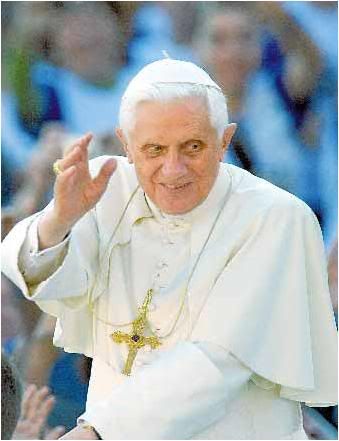 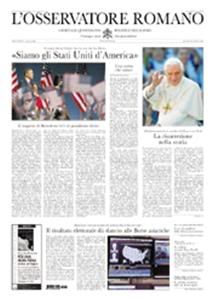
The main story on Page 1 was the outcome of the US presidential election, with
a report on the message sent by the Holy Father to President-elect Obama (reported
yesterday on this page from Vatican Radio's service), an editorial commentary on
the election, and a report that Asian markets reacted positively to Obama's election.
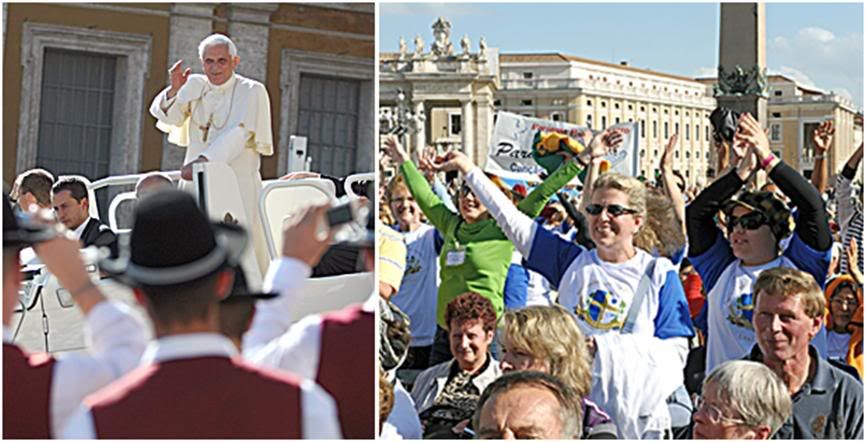
The main papal story was the General Audience and the Holy Father's catechesis on the Resurrection in the preaching of St. Paul. In the inside pages, there are two stories on Pius XII (the opening of the Vatican photo exhibit by Cardinal Bertone) and the culture of his time; and on Pius X and his liturgical reform in the 19th century.
THE POPE'S DAY
The Holy Father met today with:
- H.E. Madame Lamia Aly Hamada Mekhemar, Ambassador of Egypt, who presented her credentials.
Address in French.
- Bishops of Bolivia on ad-limina visit.
- Participants of the Catholic-Muslim Forum on the concluding day of their first sessions.
Address in English.
Pope to new Egyptian envoy:
Fraternal relations between religions
must be favored

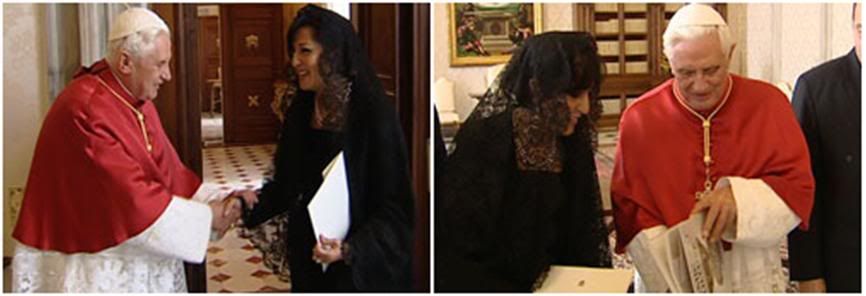
VATICAN CITY, 6 NOV 2008 (VIS) - Pope Benedict XVI today received the Letters of Credence of Lamia Aly Hamada Mekhemar, the new ambassador of the Arab Republic of Egypt to the Holy See.
In his address to her, the Holy Father spoke of "Egypt's many efforts to favour peace and harmony, and to seek solutions that respect States and persons", indicating that these efforts "concord with those of the Holy See which also strives to favour and promote" such things.
"Religions", he said, "can and must be factors of peace. Yet despite everything they can be poorly understood and used to provoke violence and death. Respecting the sensibilities and history of each country and of each human or religious community, ... and above all an authentic desire to seek peace, favours the reconciliation of peoples and the peaceful coexistence of everyone".
After highlighting how Egypt "has always been known as a land of hospitality for countless refuges, both Muslim and Christian, who have sought security and peace in its territory", Benedict XVI expressed the hope that "this noble tradition many continue for the good of everyone".
Referring then to the reciprocal understanding and respect between Islam and Christianity, the Pope pointed out that although much progress has been made in this field, "there still remains a long way to go".
"What is important above all", he continued, "is to promote good mutual understanding. This cannot be limited to a restricted group of dialogue but little by little must irradiate out to the people who in their daily lives, in cities and villages, have to develop a mentality of reciprocal respect, one that can lead to mutual esteem".
The Holy Father indicated that the Catholic community in Egypt, despite being very small, "demonstrates the great diversity that exists in out Church and the possibility of harmonious coexistence between the great Eastern and Western traditions. Their historic social commitment to the people of Egypt in the fields of education, healthcare and charity work, bears witness to a gratuitous love that knows no religious distinction. This is something understood and appreciated by Egyptian society as a whole".
"In your country, the Catholic Church also wants to enter into contact with the many visiting Catholic tourists who wish to practice their religion. I am convinced that they will soon be given the chance to pray to God in a dignified fashion at appropriate places of worship in the new tourist sites that have come into being in the last few years. It would be a good signal to the world if Egypt were to favour relations of friendship and fraternity among religions and peoples, in accordance with its ancient and noble traditions".
[Modificato da TERESA BENEDETTA 07/11/2008 00:36] |
 06/11/2008 18:44 06/11/2008 18:44 |
|
| | | OFFLINE | | Post: 15.597 | Registrato il: 28/08/2005
| Utente Gold | |
|
 BENEDICT XVI MEETS
BENEDICT XVI MEETS
PARTICIPANTS IN FIRST-EVER SEMINAR
OF THE CATHOLIC-MUSLIM FORUM
The Holy Father received the participants of the seminar at the Sala Clementina in a noontime audience today.
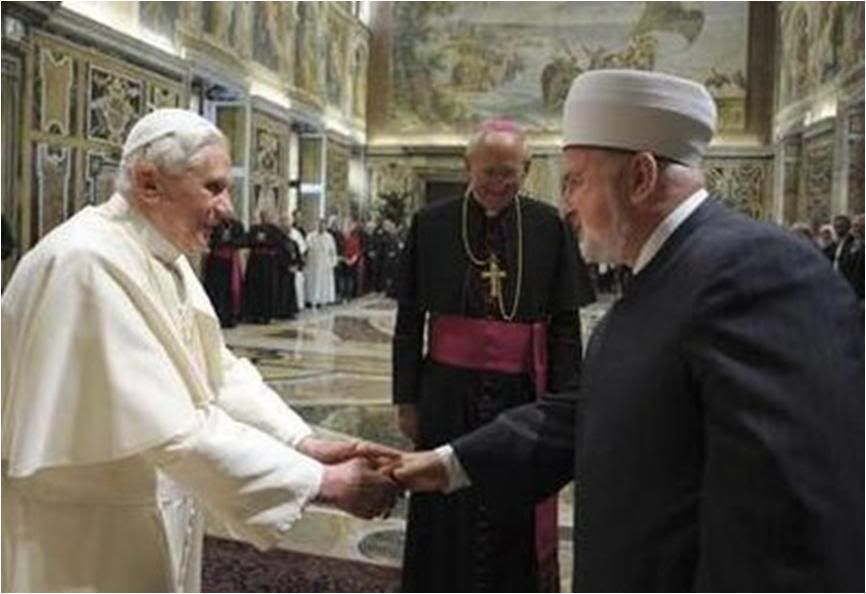
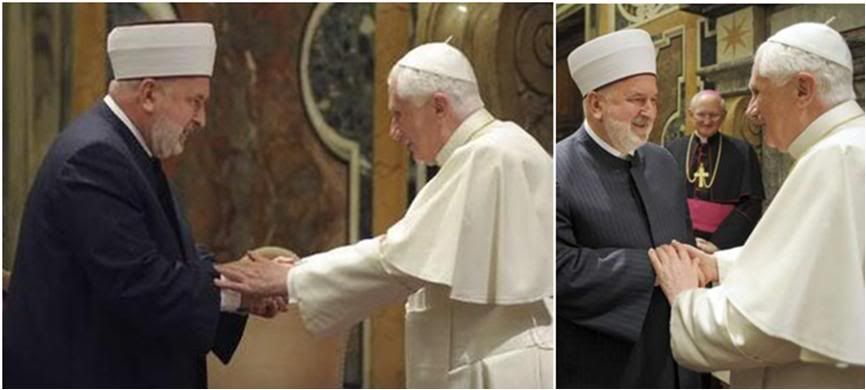 The Holy Father greets Mustafa Ceric, Grand Mufti of Bosnia-Herzegovina and head of the Muslim panel at the meetings.
The Holy Father greets Mustafa Ceric, Grand Mufti of Bosnia-Herzegovina and head of the Muslim panel at the meetings.
In the background is Cardinal Tauran, president of the Pontifical Council for Inter-Religious Dialog.
Pope receives participants
at historic talks with Muslims

Vatican City, Nov. 6 (dpa) - Pope Benedict XVI and the Grand Mufti of Bosnia-Herzegovina, Shaykh Mustafa Ceric, clasped hands and then hugged Thursday as the Pontiff met participants at historic talks aimed at defusing tensions between Catholics and Muslims.
"I was pleased to learn that you were able at this meeting to adopt a common position on the need to worship God totally and to love our fellow men and women disinterestedly, especially those in distress and need," Benedict told attendees of the Catholic-Muslim Forum.
The forum was to wrap up three days of talks at the Vatican with a public session later Thursday.
Ceric, who headed the Muslim representatives in the forum, said the talks represented a "great step," both for Christian-Muslim relations and for "the whole of humanity."
He thanked the Pope for his "warm hospitality," and reminded the Pontiff that his predecessor, John Paul II, had prayed for him during the four-year siege of Sarajevo in the 1990s.
The forum stems from an October 2007 open letter sent by 138 Muslim representatives to the pope and to the heads of other Christian churches, inviting them to engage in dialogue. [Another revisionist who refuses to credit Regensburg as having caused all this!]
The letter proposed working together to avoid a repetition of incidents such as the violent protests in the Islamic world triggered by the 2005 publication in a Danish newspaper of cartoons depicting the prophet Mohammed.
Under the theme "Love of God, Love of Neighbour," the talks also represent the latest move in rapprochement between the Vatican and Muslims since Benedict's controversial 2006 speech in Regensburg, Germany in which he appeared to associate Islam with violence.
Benedict on Thursday, stressed "fundamental human rights," which he said, Christians and Muslims shared.
"Political and religious leaders have the duty of ensuring the free exercise of these rights in full respect for each individual's freedom of conscience and freedom of religion," the pontiff told forum members, including representatives from the Middle East, Asia, Africa and Western nations.
The Vatican, which emphasizes the need for "reciprocity" in relations between different religions, has lamented that those who convert from Islam to other religions often face persecution in some predominantly Muslim countries.
"The discrimination and violence which even today religious people experience throughout the world, and the often violent persecutions to which they are subject, represent unacceptable and unjustifiable acts, all the more grave and deplorable when they are carried out in the name of God," Benedict said, without giving specific examples.
US-based Islamic scholar, Seyyed Hossein Nasr, who also spoke at the papal audience, touched on the volatile issue of Christians spreading their message among Muslims.
" Muslims do not allow an aggressive proselytizing in our midst that would destroy our faith in the name of freedom," Nasr told the pontiff. [He has a nerve! He lives in the United States, where surely, he knows how active some denominations are - the Mormons and the evangelicals, particularly - in evangelizing. The problem is what Christians consider normal evangelization can always be mis-characterized by Muslims - or Orthodox Russians, for that matter, with respect to Catholics - as 'aggressive proselytism'. What can be more aggressive than Saudi Arabia or Iran arresting and penalizing Christians for simply wearing a crucifix in public?]
Christians would also adopt the same stance, if they were "in our situation," he added, without providing further details. [Can the good professor name one single instance in our day where a Christian nation has ever interfered with the religious activities of Muslims in their midst????]

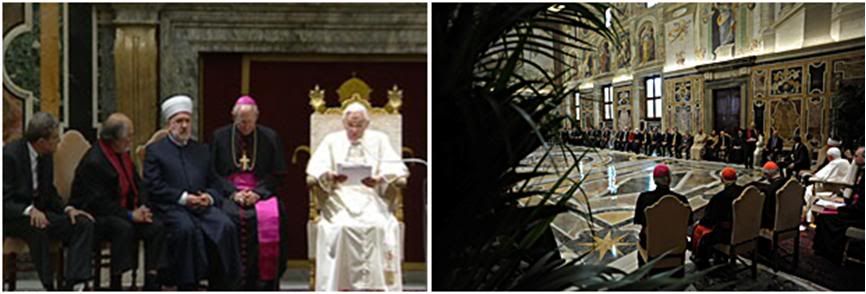
THE HOLY FATHER'S ADDRESS
Dear Friends,
I am pleased to receive you this morning and I greet all of you most cordially. I thank especially Cardinal Jean-Louis Tauran as well as Shaykh Mustafa Cerić and Mr Seyyed Hossein Nasr for their words.
Our meeting takes place at the conclusion of the important Seminar organized by the Catholic-Muslim Forum established between the Pontifical Council for Inter-religious Dialogue and representatives of the 138 Muslim leaders who signed the Open Letter to Christian leaders of 13 October 2007.
This gathering is a clear sign of our mutual esteem and our desire to listen respectfully to one another. I can assure you that I have prayerfully followed the progress of your meeting, conscious that it represents one more step along the way towards greater understanding between Muslims and Christians within the framework of other regular encounters which the Holy See promotes with various Muslim groups.
The Open Letter "A Common Word between us and you" has received numerous responses, and has given rise to dialogue, specific initiatives and meetings, aimed at helping us to know one another more deeply and to grow in esteem for our shared values.
The great interest which the present Seminar has awakened is an incentive for us to ensure that the reflections and the positive developments which emerge from Muslim-Christian dialogue are not limited to a small group of experts and scholars, but are passed on as a precious legacy to be placed at the service of all, to bear fruit in the way we live each day.
The theme which you have chosen for your meeting – "Love of God, Love of Neighbour: The Dignity of the Human Person and Mutual Respect" – is particularly significant. It was taken from the Open Letter, which presents love of God and love of neighbour as the heart of Islam and Christianity alike.
This theme highlights even more clearly the theological and spiritual foundations of a central teaching of our respective religions.
The Christian tradition proclaims that God is Love (cf. 1 Jn 4:16). It was out of love that he created the whole universe, and by his love he becomes present in human history.
The love of God became visible, manifested fully and definitively in Jesus Christ. He thus came down to meet man and, while remaining God, took on our nature. He gave himself in order to restore full dignity to each person and to bring us salvation. How could we ever explain the mystery of the incarnation and the redemption except by Love?
This infinite and eternal love enables us to respond by giving all our love in return: love for God and love for neighbour. This truth, which we consider foundational, was what I wished to emphasize in my first Encyclical, Deus Caritas Est, since this is a central teaching of the Christian faith. Our calling and mission is to share freely with others the love which God lavishes upon us without any merit of our own.
I am well aware that Muslims and Christians have different approaches in matters regarding God. Yet we can and must be worshippers of the one God who created us and is concerned about each person in every corner of the world.
Together we must show, by our mutual respect and solidarity, that we consider ourselves members of one family: the family that God has loved and gathered together from the creation of the world to the end of human history.
I was pleased to learn that you were able at this meeting to adopt a common position on the need to worship God totally and to love our fellow men and women disinterestedly, especially those in distress and need.
God calls us to work together on behalf of the victims of disease, hunger, poverty, injustice and violence. For Christians, the love of God is inseparably bound to the love of our brothers and sisters, of all men and women, without distinction of race and culture.
As Saint John writes: "Those who say, ‘I love God,’ and hate their brothers or sisters are liars; for those who do not love a brother or sister whom they have seen, cannot love God whom they have not seen" (1 Jn 4:20).
The Muslim tradition is also quite clear in encouraging practical commitment in serving the most needy, and readily recalls the "Golden Rule" in its own version: your faith will not be perfect, unless you do unto others that which you wish for yourselves.
We should thus work together in promoting genuine respect for the dignity of the human person and fundamental human rights, even though our anthropological visions and our theologies justify this in different ways.
There is a great and vast field in which we can act together in defending and promoting the moral values which are part of our common heritage.
Only by starting with the recognition of the centrality of the person and the dignity of each human being, respecting and defending life which is the gift of God, and is thus sacred for Christians and for Muslims alike – only on the basis of this recognition, can we find a common ground for building a more fraternal world, a world in which confrontations and differences are peacefully settled, and the devastating power of ideologies is neutralized.
My hope, once again, is that these fundamental human rights will be protected for all people everywhere.
Political and religious leaders have the duty of ensuring the free exercise of these rights in full respect for each individual’s freedom of conscience and freedom of religion.
The discrimination and violence which even today religious people experience throughout the world, and the often violent persecutions to which they are subject, represent unacceptable and unjustifiable acts, all the more grave and deplorable when they are carried out in the name of God.
God’s name can only be a name of peace and fraternity, justice and love. We are challenged to demonstrate, by our words and above all by our deeds, that the message of our religions is unfailingly a message of harmony and mutual understanding.
It is essential that we do so, lest we weaken the credibility and the effectiveness not only of our dialogue, but also of our religions themselves.
I pray that the Catholic-Muslim Forum, now confidently taking its first steps, can become ever more a space for dialogue, and assist us in treading together the path to an ever fuller knowledge of Truth.
The present meeting is also a privileged occasion for committing ourselves to a more heartfelt quest for love of God and love of neighbour, the indispensable condition for offering the men and women of our time an authentic service of reconciliation and peace.
Dear friends, let us unite our efforts, animated by good will, in order to overcome all misunderstanding and disagreements.
Let us resolve to overcome past prejudices and to correct the often distorted images of the other which even today can create difficulties in our relations; let us work with one another to educate all people, especially the young, to build a common future.
May God sustain us in our good intentions, and enable our communities to live consistently the truth of love, which constitutes the heart of the religious man, and is the basis of respect for the dignity of each person.
May God, the merciful and compassionate One, assist us in this challenging mission, protect us, bless us and enlighten us always with the power of his love.
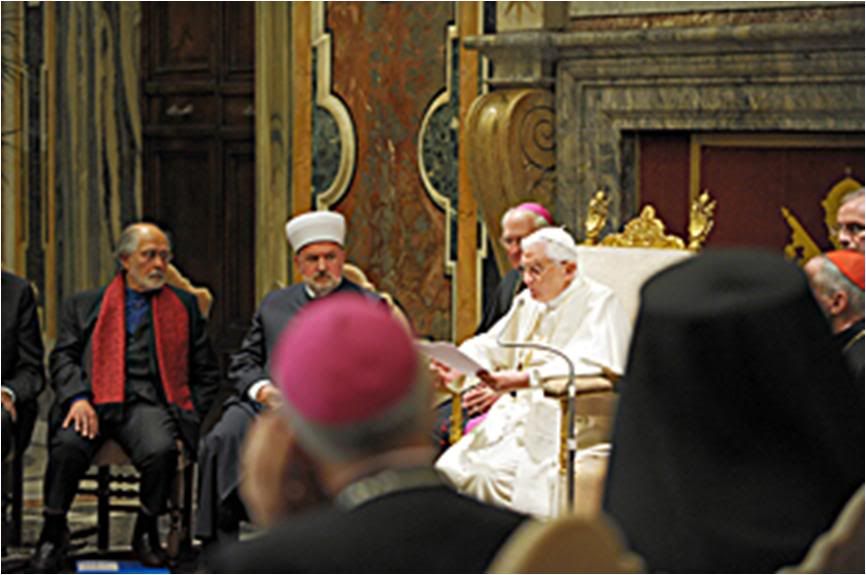
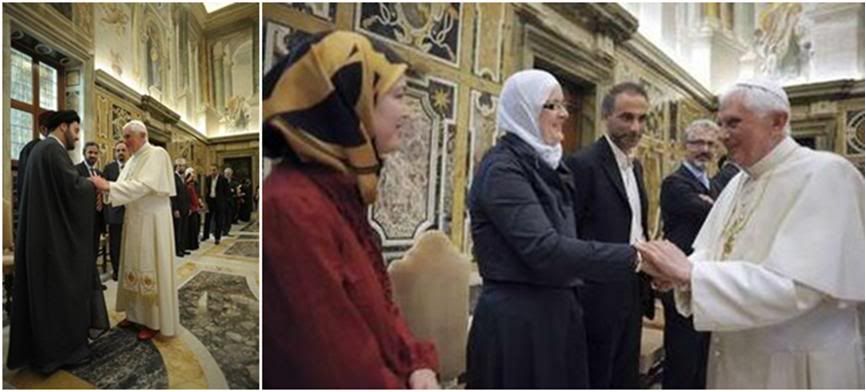 The Holy Father greets members of the Muslim delegation individually: From the left, Ingrid Mattson, president of the Islamic Society of North America; Madame Ceric, wife of the delegation head; and controversial Islamologue Prof. Tariq Ramadan. The fourth man was not identified.
Here is a report on a statement made by one of the Muslim participants at the audience with the Pope today:
'Let us learn something
The Holy Father greets members of the Muslim delegation individually: From the left, Ingrid Mattson, president of the Islamic Society of North America; Madame Ceric, wife of the delegation head; and controversial Islamologue Prof. Tariq Ramadan. The fourth man was not identified.
Here is a report on a statement made by one of the Muslim participants at the audience with the Pope today:
'Let us learn something
from each other'
Translated from

"We meet each other in the love of God," said Seyyed Hossein Nasr, professor of Islamic studies at George Washington University, said today at the audience with Pope Benedict.
"The goal of peace is common to both our religions, and we are here precisely in the hope of establishing peace between Christianity and Islam," Nasr said in addressing the Pope in the name of the Muslim delegation.
He pointed out that "both our histories have been marked by periods of violence, when religion was powerful in society and various political forces perpetrated violence in its name, in which cases, such violence was legitimized by religious authorities. We certainly cannot say that violence has been a prerogative of any single religion".
Nasr referred to the various experiences of Christianity with Islam in the context of secular humanism and the rationalism that was associated with the enlightenment, adding: "Perhaps we can learn from each other. We should unite in the battle against the desacralization and anti-religion forces of the modern world - a joint effort which should bring us closer together."
* * * * * * * * * * * * * * * * * * * * * * * * * * * * * * * * * * * * * * * * * * * * * * * * * * * * * * * * *
L'Osservatore Romano's online version for tomorrow, 11/7/08, has been posted, and contains the text of the Final Declaration of the Forum but only in Italian. It is strange that it has not come out so far in the regular Press Office bulletin for the day.
As it is short and fairly simple, I am going ahead with a translation. I will replace it when the official text comes out. The original must be in English which is the common language of all the participants. .
FINAL DECLARATION
The Catholic-Muslim Forum was created by the Pontifical Council for Inter-Religious Dialog and a delegation representing the 138 Muslim signatories of the open letter entitled ‘A Common Word’ in the light of the letter and the response of His Holiness Benedict XVI through his Secretary of State, Cardinal Tarcisio Bertone.
The Forum’s first activity was the seminar held in Rome on November 4-6, 2008, with 24 participants and 5 advisers on each side. The theme of the seminar was "Love of God, Love of Neighbor”. The discussions, conducted in a warm spirit of conviviality, was focused on two major subjects with respect to the seminar theme: ‘theological and spiritual foundations’ and ‘human dignity and reciprocal respect’. Points of similarity as well as differences emerged which reflect the specific genius of each religion.
1. For Christians, the source and example of the love of God and neighbor is the love of Christ for his Father, for mankind and for every person. “God is love” (1 Jn 4,16) and ‘God so loved the world that he gave his only-begotten Son so that whoever believes in him will not die, but will have eternal life” (Jn 3,16).
Love of God is placed in the heart of man by the Holy Spirit. It is God who loved us first, so that we may love him in turn. Love does not harm our neighbor, but rather seeks to do to the other what we would want done to us (cfr 1 Cor 13,4-17)).
Love is the foundation and sum of all the commandments (cfr Gal 5,14). Love of neighbor cannot be separated from love of God because it is an expression of our love for God. This is the new commandment – “that you love each other as I have loved you (Jn 15,12).
Rooted in the sacrificial love of Christ, Christian love forgives without excluding anyone, not even one’s own enemies. These should not remain words but facts (cfr 1 Jn 4,18). This is the sign of its authenticity.
For Muslims, as stated in 'A Common Word', love is a transcendent and imperishable force which guides and transforms reciprocal human respect. This love, as indicated by the holy and beloved prophet Mohammed, precedes human love for the one and triune God. [How can this be, when Muslims don’t believe in the Trinity?]
A hadith [statement attributed to Mohammed] says that God’s loving compassion for mankind is even greater than that of a mother for her own child (Muslim, Bab al-Tawba: 21). Thus it exists first and independently of the human response to the unique One who is ‘loving’.
This love and this compassion are so immense that God intervened to guide and save mankind in a perfect way, many times and in many places, sending prophets and scriptures.
The last of these books, the Koran, depicts a world of signs, a marvelous cosmos of divine mastery, which inspires our absolute love and devotion so that “those who believe have a much greater love for Allah” (2:165) and “in truth, the Compassionate One concedes his love to those who believe and do good” (19:96).
In another hadith we read that “None of you have faith unless you love your neighbor as you love yourself” (Bukhari, Bab al-Iman: 13).
2. Human life is a most precious gift from God; therefore, it must be preserved and honored in all its phases.
3. Human dignity comes from the fact that every person is created by a loving God out of love, and that persons are offered the gifts of reason and free will, and so, they are allowed to love God and others.
On the solid basis of these principles, a person is owed respect for the dignity of his origin and his own freedom as a person, in community or in government, with the support of civil legislation which guarantees equal rights and full citizenship [to all individuals].
4. We affirm that the creation of mankind by God presents two great aspects: the human being as male and female, and we commit ourselves together to guarantee that dignity and human respect be extended to men and women on an equal basis.
5. Authentic love of neighbor implies respect for the person and his choices in questions of conscience and religion. This includes the right of individuals and communities to practice their own religion in private and in public.
6. Religious minorities have the right to be respected in their own convictions and religious practices. They also have the right to their own places of worship, and the founding figures and symbols that they consider sacred should not be subject to any form of scorn or derision.
7. As Catholic and Muslim believers, we are aware of the exhortations [the word used is 'inviti' which means 'invitations', but does not sound idiomatic in English] the imperative to bear witness to the transcendent dimension of life through a spirituality nourished by prayer, in a world that is becoming ever more secularized and materialistic.
8. We affirm that no religion nor its followers should be excluded from society. Each one should be able to make his own indispensable contribution to the good of society, particularly in service to the neediest.
9. We recognize that God’s Creation in its plurality of cultures, civilizations, languages and peoples is a source of riches, and therefore, should never become a cause for tension and conflict.
10. We are convinced that Catholics and Muslims have the duty to offer to their own faithful a healthy education in moral, religious, civil and human values, and to promote careful information about each other’s religion.
11. We profess that Catholics and Muslims are called on to be instruments of love and harmony among believers and for all mankind, renouncing any oppression, aggressive violence and terroristic acts, particularly those perpetrated in the name of religion, and to support the principle of justice for all.
12. We exhort all believers to work for an ethical financial system in which normative mechanisms take into consideration the situation of the poor and disadvantaged, both of individuals as well as of nations in debt.
We call on the privileged of the world to consider the painful plight of those who have been most seriously affected by the present crisis in the production and distribution of food, and we ask believers of every denomination and all persons of good will to cooperate in relieving the suffering of those who are hungry, and to eliminate the causes of hunger.
13. Young people are the future of religious communities and society in general. They will be living more and more in multi-cultural, multi-religious communities. It is essential that they should be well formed in their own religious traditions and well informed on other cultures and religions.
14. We have agreed to consider the possibility of creating a permanent Catholic-Muslim commission to coordinate responses to conflicts and other emergency situations, and to organize a second seminar in a country with a Muslim majority which is yet to be specified.
15. We therefore look forward to the second seminar of the Catholic-Muslim Forum which will take place in two years in a country with a Muslim majority which is yet to be specified.
All the participants are grateful to God for the gift of this time spent together and for this fruitful exchange.
At the end of the seminar, His Holiness Pope Benedict XVI, after remarks by Prof. Seyyed Hossein Nasr and the Grand Mufti Mustafa Ceric, spoke to the group.
Everyone present expressed satisfaction for the results of the seminar and look forward to an even more profitable dialog.
The Muslim signatories are committing themselves to principles and conditions that do not now exist in most Muslim states, including the countries they come from (Saudi Arabia, Algeria, Morocco, to name a few):
- Equal rights for men and women? Universally, haven't Muslim women always had less rights than Muslim men?????
- Freedom of religion and religious practice? Tell that to Muslim countries where to be non-Muslim can be a legal cause for execution!
- Civil legislation to guarantee equal rights and full citizenship for all - including religious minorities? What about dhimmi, which institutionalizes second-class citizenship if not outright pariah status?????
Can they go home and present this declaration to their respective governments and say, "Look, we must respect these principles"? If they cannot and will not, is not all this a big sham?
And I am still stumped by the statement about 'the one and triune God' that comes in the same sentence as the name of Mohammed: "Questo amore, come indicato dal Santo e amato profeta Maometto, precede l'amore umano per il Dio uno e trino" (This love, as indicated by the holy and beloved prophet Mohammed, precedes human love for the one and triune God).
11/7/08
Here is the original English text of the Final Declaration as published in L'Osservatore Romano for 11/8/08. I am retianing my original translation because of the comments and highlighting I made.
The first thing I checked, of curse, was that statement about 'the one and triune God". It turns out the original phrase in English is the 'one true God'. Apparently, whoever translated it to Italian read the word 'true' as 'triune', thus translating it to 'trino'. In the Italian translation published in OR, it now reads "l'amore umano per l'Unico Vero Dio', intead of 'l'amore umano per Dio uno e trino'!
FINAL DECLARATION -
ORIGINAL ENGLISH TEXT
The Catholic-Muslim Forum was formed by the Pontifical Council for Interreligious Dialogue and a delegation of the 138 Muslim signatories of the open letter called A Common Word, in the light of the same document and the response of His Holiness Benedict XVI through his Secretary of State, Cardinal Tarcisio Bertone. Its first Seminar was held in Rome from 4-6 November 2008.
Twenty-four participants and five advisors from each religion took part in the meeting. The theme of the Seminar was "Love of God, Love of Neighbour".
The discussion, conducted in a warm and convivial spirit, focused on two great themes: "Theological and Spiritual Foundations" and "Human Dignity and Mutual Respect". Points of similarity and of diversity emerged, reflecting the distinctive specific genius of the two religions.
1. For Christians the source and example of love of God and neighbour is the love of Christ for his Father, for humanity and for each person. "God is Love" (1 Jn 4: 16) and "God so loved the world that He gave his only Son so that whoever believes in him shall not perish but have eternal life" (Jn 3: 16).
God's love is placed in the human heart through the Holy Spirit. It is God who first loves us thereby enabling us to love Him in return. Love does not harm one's neighbour but rather seeks to do to the other what one would want done to oneself (cf. 1 Cor 13: 4-7).
Love is the foundation and sum of all the commandments (cf. Gal 5: 14). Love of neighbour cannot be separated from love of God, because it is an expression of our love for God. This is the new commandment, "Love one another as I have loved you" (Jn 15: 12).
Grounded in Christ's sacrificial love, Christian love is forgiving and excludes no one; it therefore also includes one's enemies. It should be not just words but deeds (cf. 1 Jn 4: 18). This is the sign of its genuineness.
For Muslims, as set out in A Common Word, love is a timeless transcendent power which guides and transforms human mutual regard. This love, as indicated by the Holy and Beloved Prophet Muhammad, is prior to the human love for the One True God.
A Hadith indicates that God's loving compassion for humanity is even greater than that of a mother for her child (Muslim, Bab al-Tawba: 21); it therefore exists before and independently of the human response to the One who is "The Loving'.
So immense is this love and compassion that God has intervened to guide and save humanity in a perfect way many times and in many places, by sending prophets and scriptures.
The last of these books, the Qur'an, portrays a world of signs, a marvellous cosmos of Divine artistry, which calls forth our utter love and devotion, so that "those who have faith, have most love of God' (2: 165), and "those that believe, and do good works, the Merciful shall engender love among them' (19: 96).
In a Hadith we read that "Not one of you has faith until he loves for his neighbour what he loves for himself' (Bukhari, Bab al-Iman: 13).
2. Human life is a most precious gift of God to each person. It should therefore be preserved and honoured in all its stages.
3. Human dignity is derived from the fact that every human person is created by a loving God out of love, and has been endowed with the gifts of reason and free will, and therefore enabled to love God and others.
On the firm basis of these principles, the person requires the respect of his or her original dignity and his or her human vocation. Therefore, he or she is entitled to full recognition of his or her identity and freedom by individuals, communities and governments, supported by civil legislation that assures equal rights and full citizenship.
4. We affirm that God's creation of humanity has two great aspects: the male and the female human person, and we commit ourselves jointly to ensuring that human dignity and respect are extended on an equal basis to both men and women.
5. Genuine love of neighbour implies respect of the person and her or his choices in matters of conscience and religion. It includes the right of individuals and communities to practice their religion in private and public.
6. Religious minorities are entitled to be respected in their own religious convictions and practices. They are also entitled to their own places of worship, and their founding figures and symbols they consider sacred should not be subject to any form of mockery or ridicule.
7. As Catholic and Muslim believers, we are aware of the summons and imperative to bear witness to the transcendent dimension of life, through a spirituality nourished by prayer, in a world which is becoming more and more secularized and materialistic.
8. We affirm that no religion and its followers should be excluded from society. Each should be able to make its indispensable contribution to the good of society, especially in service to the most needy.
9. We recognize that God's creation in its plurality of cultures, civilizations, languages and peoples is a source of richness and should therefore never become a cause of tension and conflict.
10. We are convinced that Catholics and Muslims have the duty to provide a sound education in human, civic, religious and moral values for their respective members and to promote accurate information about each other's religions.
11. We profess that Catholics and Muslims are called to be instruments of love and harmony among believers, and for humanity as a whole, renouncing any oppression, aggressive violence and terrorism, especially that committed in the name of religion, and upholding the principle of justice for all.
12. We call upon believers to work for an ethical financial system in which the regulatory mechanisms consider the situation of the poor and disadvantaged, both as individuals, and as indebted nations.
We call upon the privileged of the world to consider the plight of those afflicted most severely by the current crisis in food production and distribution, and ask religious believers of all denominations and all people of good will to work together to alleviate the suffering of the hungry, and to eliminate its causes.
13. Young people are the future of religious communities and of societies as a whole. Increasingly, they will be living in multicultural and multireligious societies. It is essential that they be well formed in their own religious traditions and well informed about other cultures and religions.
14. We have agreed to explore the possibility of establishing a permanent Catholic-Muslim committee to coordinate responses to conflicts and other emergency situations and of organizing a second seminar in a Muslim-majority country yet to be determined.
15. We look forward to the second Seminar of the Catholic-Muslim Forum to be convened in approximately two years in a Muslim-majority country yet to be determined.
All participants felt gratitude to God for the gift of their time together and for an enriching exchange.
At the end of the Seminar His Holiness Pope Benedict XVI received the participants and, following addresses by Professor Dr Seyyed Hossein Nasr and H.E. Grand Mufti Dr Mustafa Ceric, spoke to the group.
All present expressed satisfaction with the results of the Seminar and their expectation for further productive dialogue.
[Modificato da TERESA BENEDETTA 07/11/2008 22:18] |
 07/11/2008 17:11 07/11/2008 17:11 |
|
| | | OFFLINE | Post: 3.407 | Registrato il: 23/11/2005
| Utente Master | |
|
Reaching across the religious divide
By David Willey
BBC Rome correspondent
Nov. 7, 2008
For two days this week, 50 leading Catholic and Muslim scholars from Europe, the Middle East and America sat behind closed doors in an anonymous-looking Vatican-owned building in the street leading up to St Peter's Basilica, mulling over what divides and what unites their two faiths.
Together, Muslim and Christian believers account for almost half the world's population.
The members of the new Catholic-Muslim Forum - 25 from each side - were attempting to establish a new dialogue after the disastrous fall-out from a speech by Pope Benedict in Germany two years ago, which was interpreted in many parts of the Islamic world as equating Islam with violence.
Some 138 Muslim leaders from around the world later wrote a letter to the Pope suggesting a new attempt to find common ground between the two religions. This week's carefully-prepared forum hosted by the Vatican was the result of that initiative.
On the third and last day of their discussions, the participants all trooped off to attend a private papal audience in the Renaissance splendour of a Vatican audience hall where Pope Benedict told them they must overcome past prejudices, and correct the often distorted images they have of each other.
The Pope did not mention his Regensburg speech.
But a professor of Islamic studies at George Washington University in Washington, Seyyed Hossein Nasr, from Iran, reminded him that throughout history "various political forces" - both Christian and Muslim - had carried out violence.
Christians in Iraq
Later in the day, the scholars and clerics assembled for a final public session in the main lecture hall of the Gregorian University in Rome. This is the Jesuit-run centre of Catholic learning where a good proportion of the world's most influential Catholic bishops have studied or lectured at one time or another in their lives.
They issued a 15-point declaration full of fine words about loving God and one's neighbour, but omitting any reference to the thorny problems of apostasy and religious conversion in the Middle East.
However, these are real issues for some of the delegates.
Taking part in the discussions was Archbishop Louis Sako, head of the beleaguered Catholic minority in Kirkuk, northern Iraq, where Islamic militants have kidnapped and killed Christians or forced them to convert to Islam. Many Iraqi Christians have chosen to flee abroad rather than convert.
"There is a difference between freedom of religion and freedom of conscience," the archbishop told me.
"In our context, freedom of religion means you can go to church and pray. But nothing else. You cannot change your religion when you are not convinced. Freedom of conscience is something else. You are responsible. In Islam there is no change of religion. They don't allow it. It is something bad.
"The Muslim scholars here have shown us their solidarity. We don't know why Christians are being attacked in Iraq. Every time I leave my country I don't know whether I shall be allowed back."
Dr Ingrid Mattson from Canada, president of the Islamic Society of North America, who also took part in the Vatican forum, explained that Christian minorities have existed in Muslim societies for centuries.
"If you look in Iraq at the mass migrations of Sunni and Shia, there is no middle class left. Unfortunately some people are trying to exploit religious hatred."
'Desire to understand'
Dr Ramsay Dass, an Iraqi medical doctor who now lives and works in Detroit and is president of the Middle East Christians Congress in the USA, sat among the few members of the public admitted to the final session of the forum.
He claims to represent an organisation of some six million Christians of all denominations now living in America who are refugees from Muslim countries.
"Christians are being persecuted for only one reason in the Middle East - because they are Christians. They have no civil liberties, they are treated as second class citizens," he told me.
"If Professor Nasr says this is not true I should like to invite him and take him around to see the true situation. I think this meeting has no teeth, it is full of spin," he added.
The new Catholic-Muslim Forum agreed to meet again in two years' time in a Muslim country yet to be decided.
I asked Cardinal Jean Louis Tauran, head of the Vatican's Council for inter-religious dialogue, who chaired the discussions, what he thought had been accomplished in Rome this week.
"We reached a good level of mutual understanding," he said. "When you see Muslims and Christians acting as brothers and sisters it's a powerful antidote to violence and war," he added.
"What is new is the atmosphere, full of fraternity, humility and a desire to understand the other. We already have meetings with the Muslims of Egypt every two years. We believers know how to live diversity in unity. This is a talent that we can put at the disposal of society."
Of course, Cardinal Tauran has to be diplomatic and watch his words - the seminar has just ended. I hope in due course- and soon - he will go back to being as blunt as he usually is and press for concrete translation of Articles 3,4,5,6,8 and 11 of the Final
declaration.
I still think there was a lot of bull in that Declaration regarding those very principles that are violated as a matter of principle and law in most Islamic states - equal rights for man an women and the respect for every individual's dignity and right to choose and practice a religion (or to change it). When being non-Muslim means being a second-class citizen and/or being particularly subject to criminal prosecution for practising your faith, where is love of God and love of neighbor?
TERESA
[Modificato da TERESA BENEDETTA 07/11/2008 22:19] |
 07/11/2008 18:05 07/11/2008 18:05 |
|
| | | OFFLINE | Post: 3.408 | Registrato il: 23/11/2005
| Utente Master | |
|
Poor Papa! If it isn't the Muslims, it's the Jews.
Holocaust group to lobby pope over Pius sainthood
Fri Nov 7, 2008 11:33am EST
By Philip Pullella
VATICAN CITY (Reuters) - Holocaust survivors and their descendants will lobby Pope Benedict to stop the process of making his wartime predecessor Pius XII a saint, saying beatifying him would be a tragedy for Catholic-Jewish relations.
The plan, involving appealing to the pope by lobbying his ambassadors around the world, was approved Thursday night in New York and will be announced formally Monday, a leader of an organization spearheading it told Reuters Friday.
"Beatifying Pius XII would be a tragedy for Catholic-Jewish relations, which have become so warm in recent years," said Elan Steinberg, vice president of the American Gathering of Jewish Holocaust Survivors and their Descendants (AGJHSD).
Some Jews have accused Pius, who reigned from 1939 to 1958, of turning a blind eye to the Holocaust. The Vatican says he worked silently behind the scenes and helped save many Jews from certain death during World War Two.
Steinberg, who is also executive director emeritus of the World Jewish Congress, said survivors' groups around the world would seek meetings with Vatican nuncios (ambassadors) to express their concern.
This is believed to be the first time Holocaust survivors have organized a global campaign to lobby the Vatican. The American group has about 60,000 members.
Thursday, Pope Benedict's deputy, Cardinal Tarcisio Bertone, said Jewish accusations were "outrageous" and that no one could tell the Vatican whether Pius should be made a saint.
"Insofar as the historical record shows, Pius was not 'Hitler's Pope', but he was the 'silent pope'," said Steinberg, 55, who is the son of Holocaust survivors.
CRY FROM THE HEART
"This is a cry from the heart. Other Jewish leaders have spoken about this but, because we are speaking on behalf of survivors, we have to be more direct. We feel the pain in a greater way," Steinberg said by telephone from New York.
Differences over what Pius's wartime role have haunted Catholic-Jewish ties for decades. The Vatican has shown signs of irritability recently as some Catholics have pushed for the Pope to expedite his sainthood process and some Jews want it frozen pending the opening of Holy See archives in about seven years.
At issue is whether Benedict should let Pius proceed on the road to sainthood by signing a decree recognizing his "heroic virtues." This would clear the way for beatification, the last step before sainthood in the Roman Catholic Church.
Benedict has so far not signed the decree, approved last year by the Vatican's saint-making department, opting instead for what the Holy See has called a period of reflection.
Jews have asked the Vatican to open up its archives for the wartime period to qualified scholars.
"I don't exclude that the archives will include some exculpatory document, but Pius did not raise his voice," Steinberg said.
"We also want to draw attention to the difference between Pius XII and Pope John XXIII (his successor). While Pius remained silent, John, when he was a Vatican diplomat in Turkey, helped save Jews and sent reports to Pius on their plight. We think John was saintly," he added.
The Vatican says while Pius did not speak out against the Holocaust, he worked behind the scenes to help Jews because direct intervention would have worsened the situation by prompting retaliation by Hitler.
It says Pius saved several hundred thousand Jewish lives by ordering churches and convents throughout Italy to hide Jews and instructing Vatican diplomats in Europe to give Jews false passports.
|
|
|
|
|